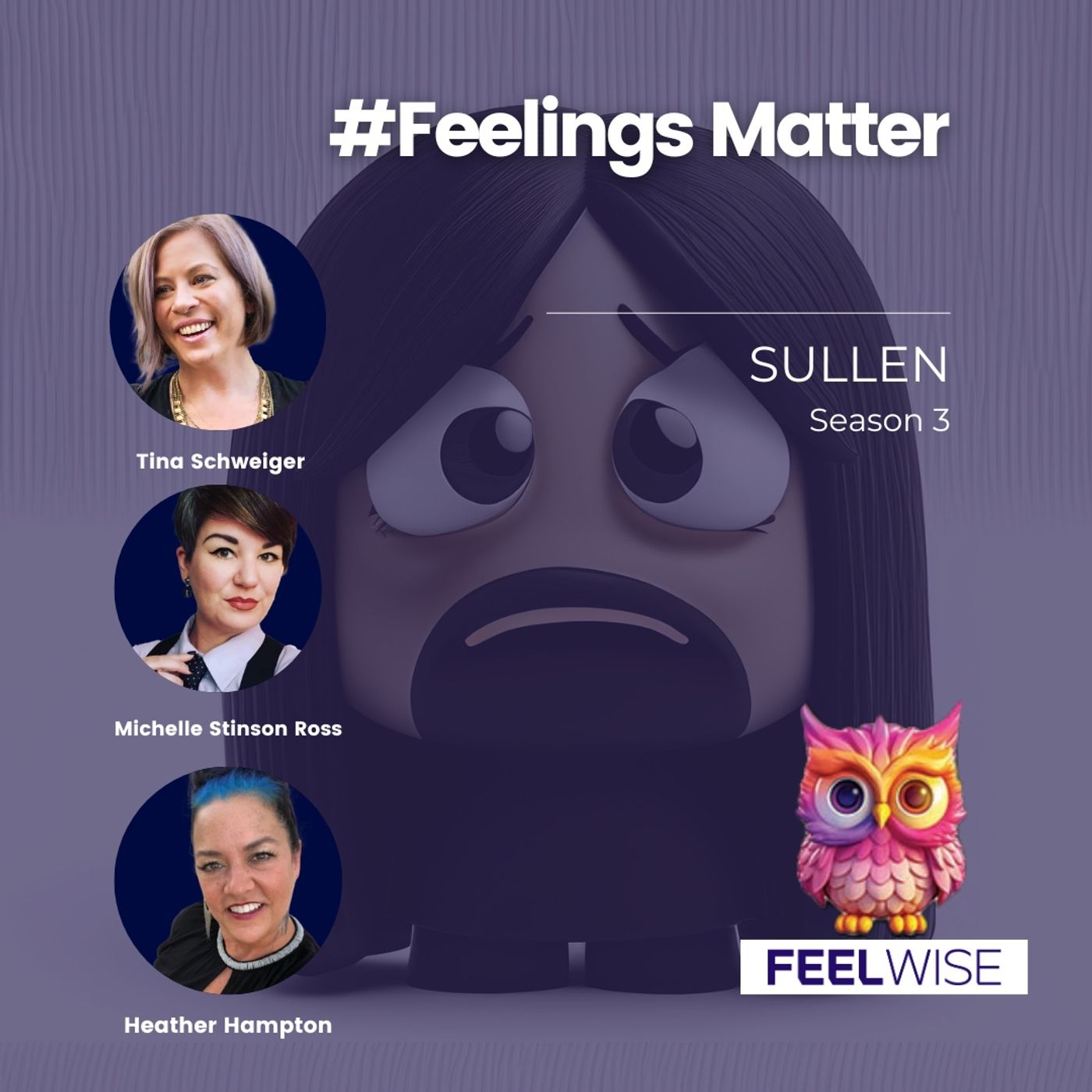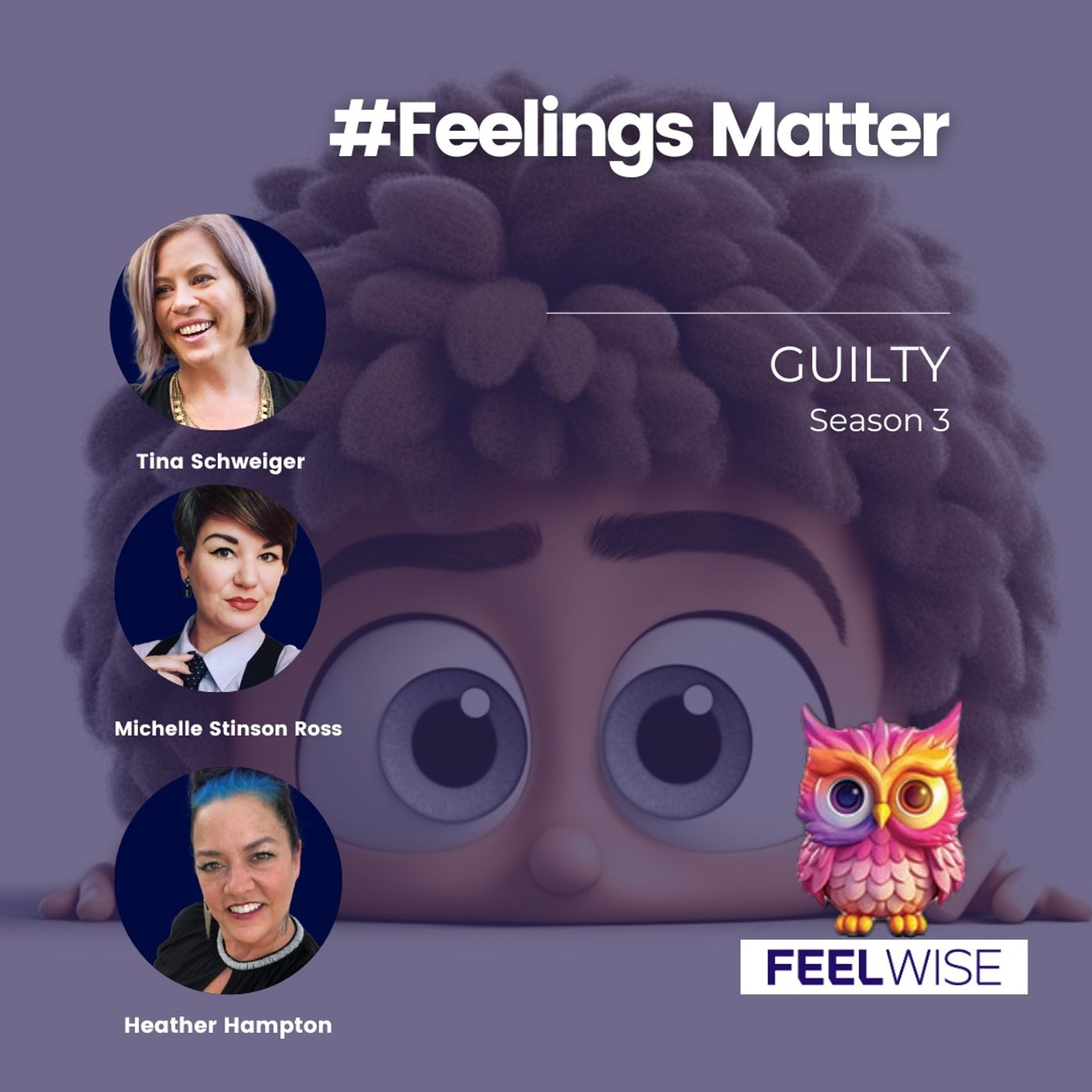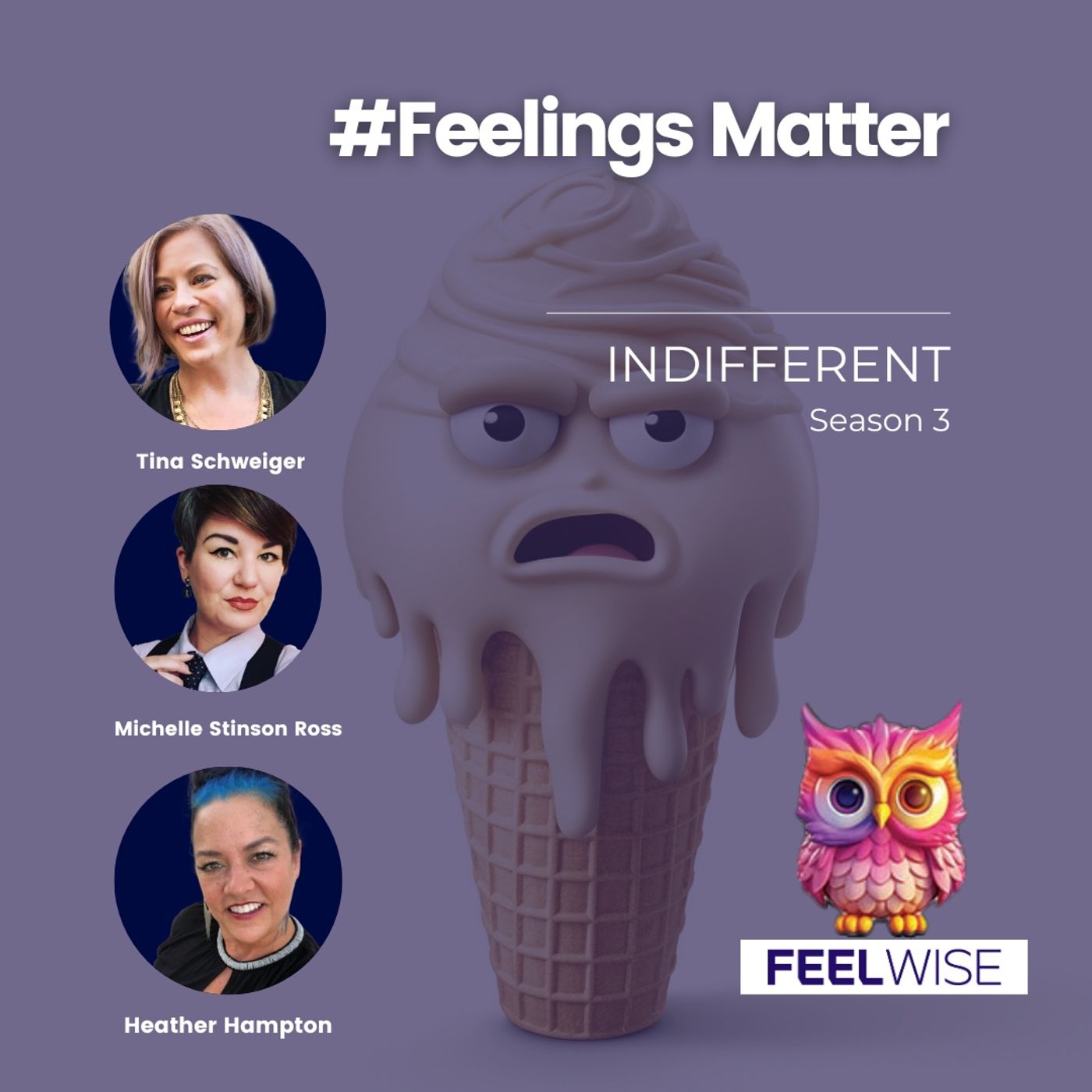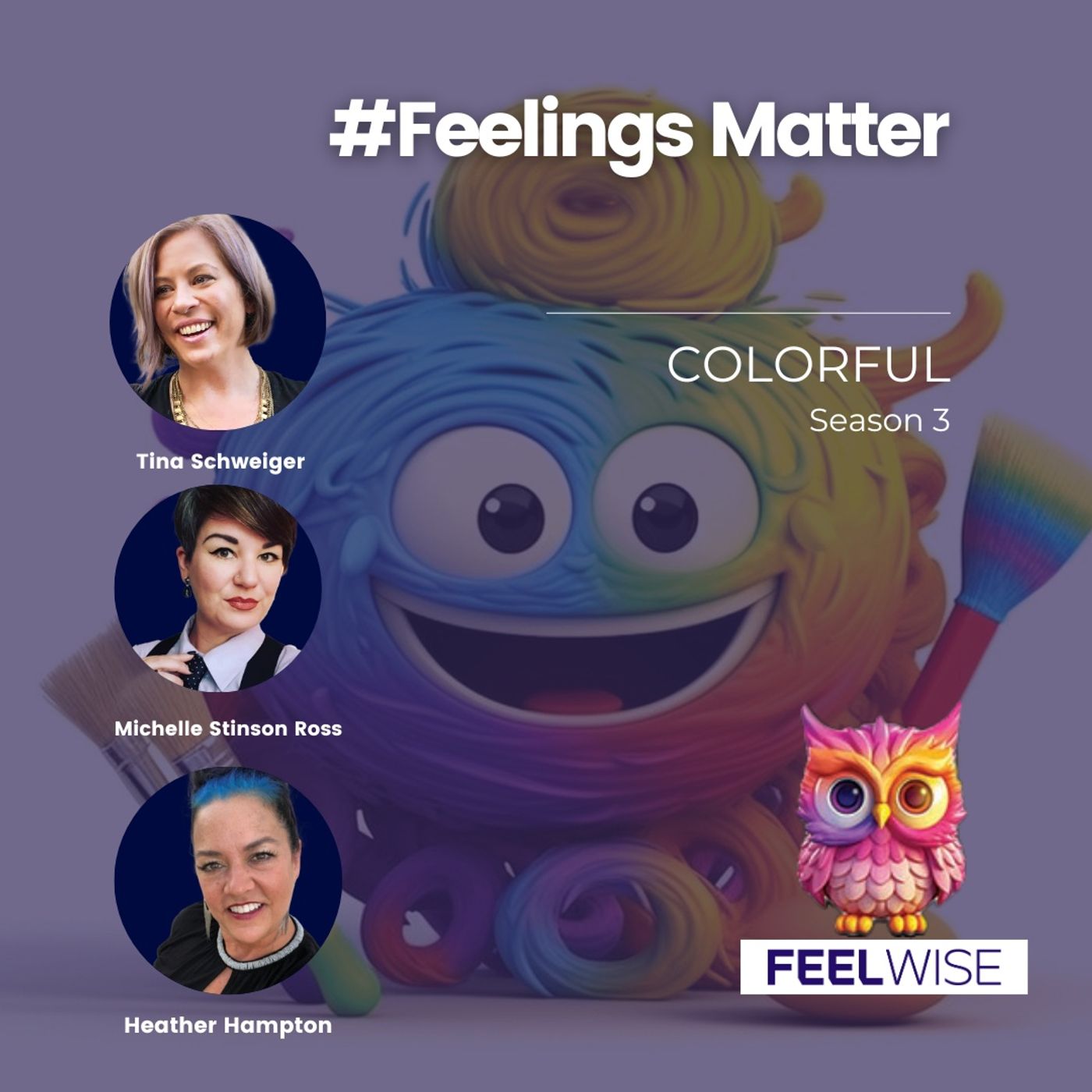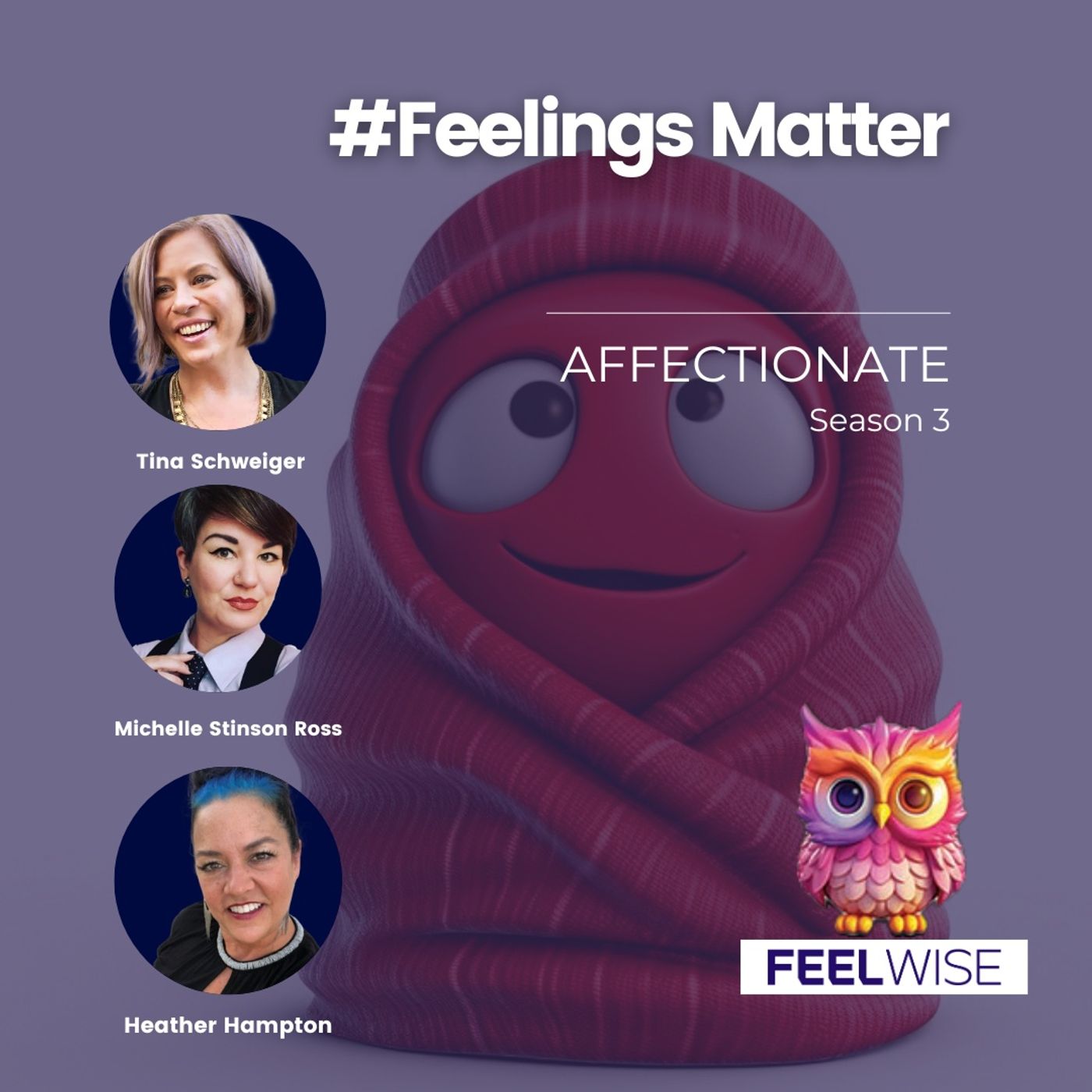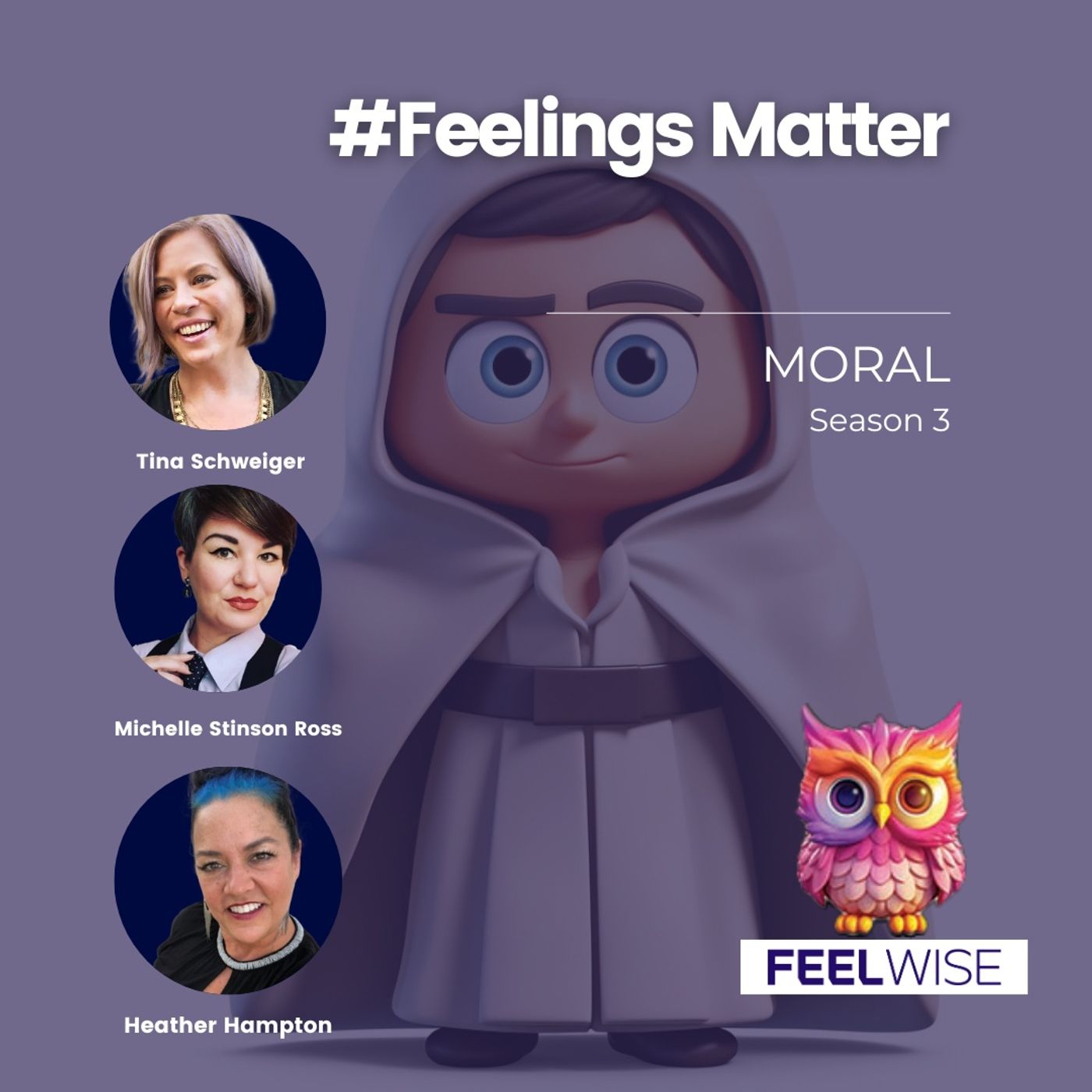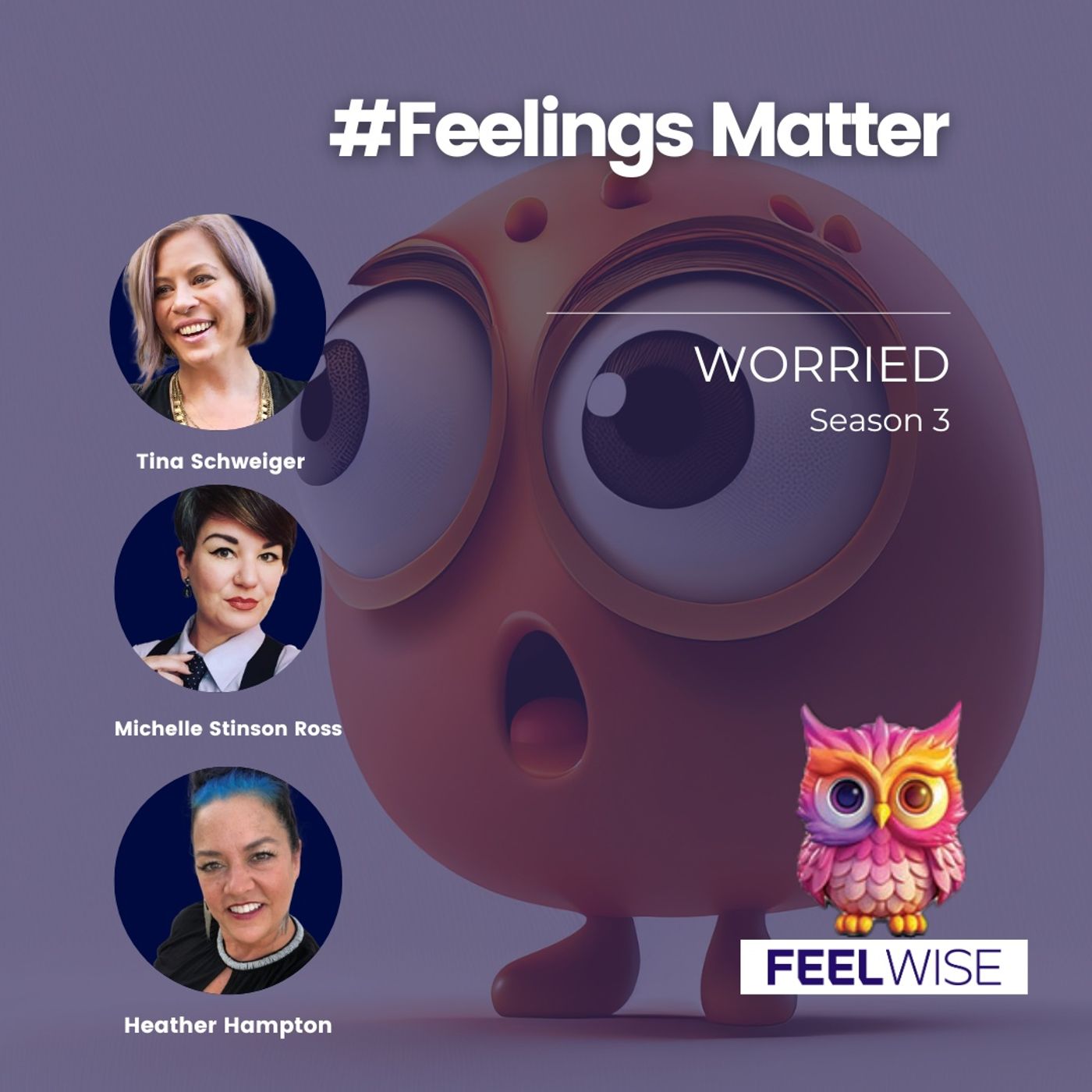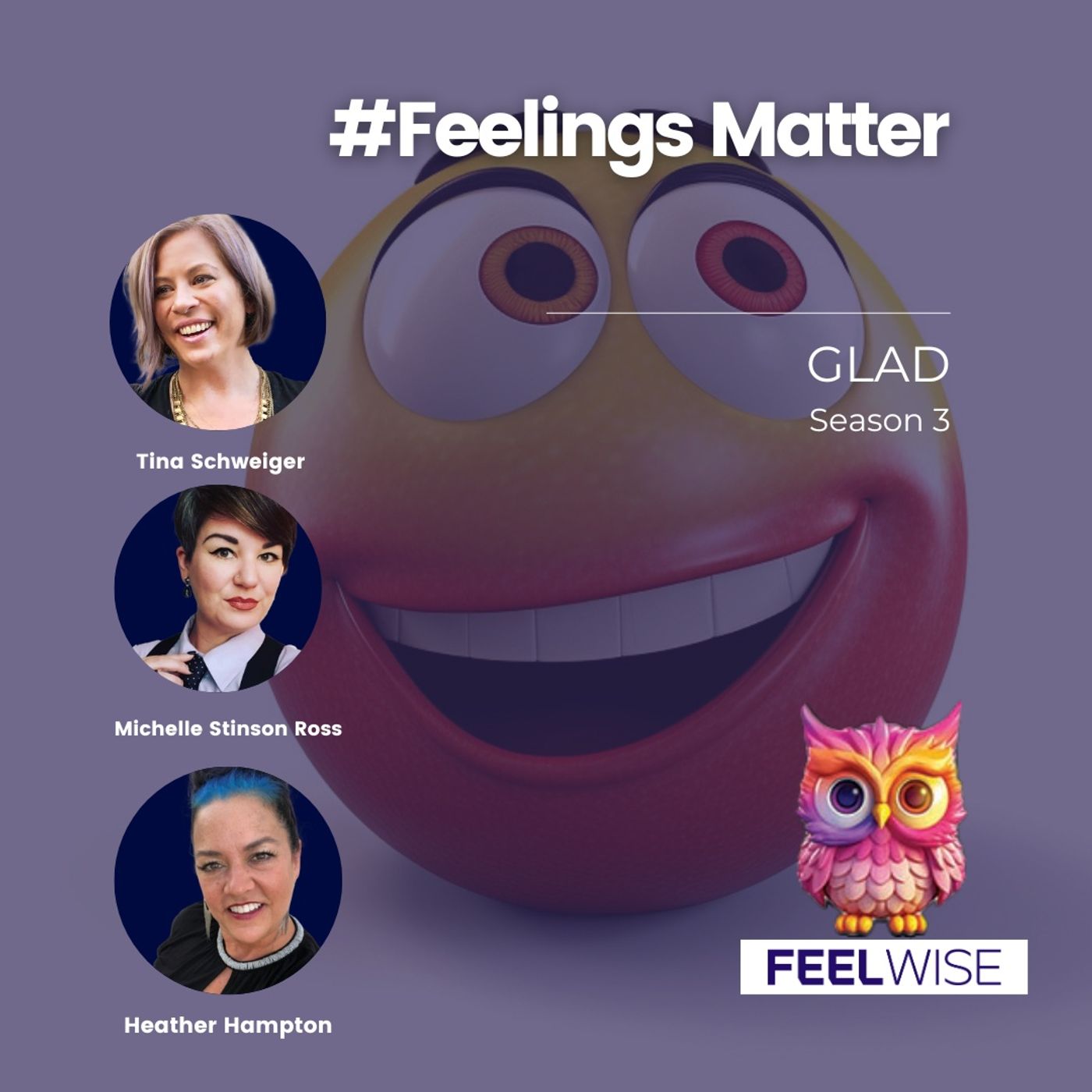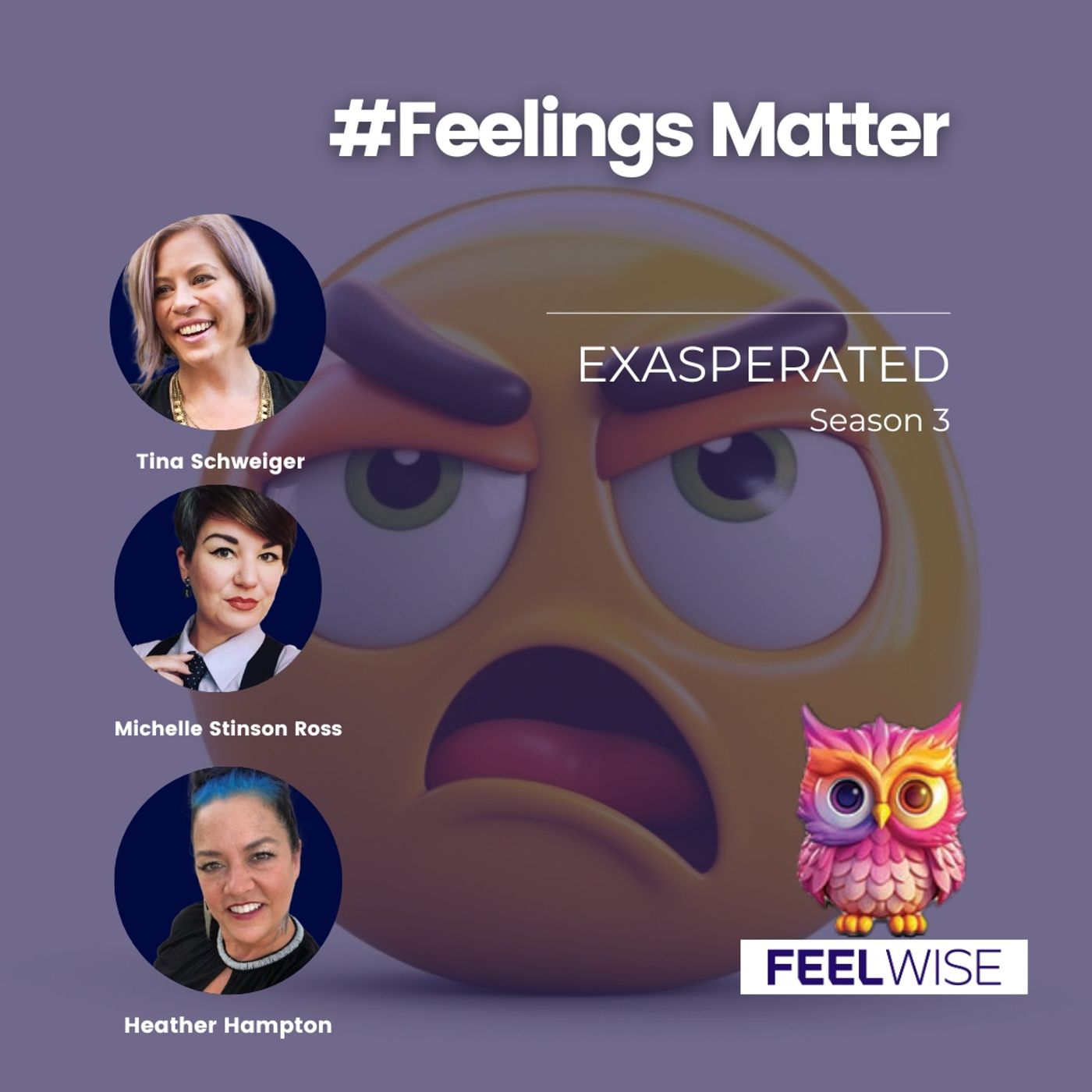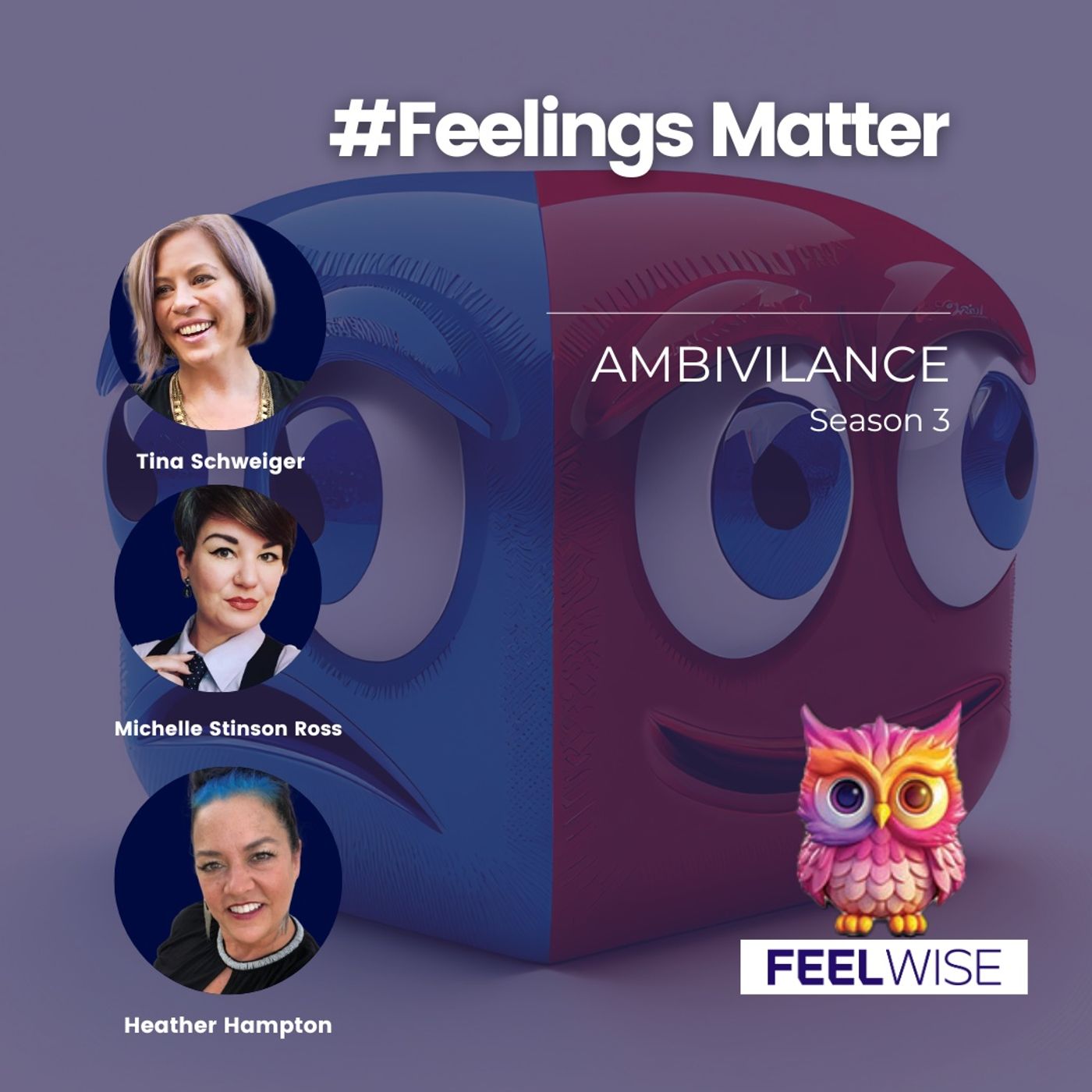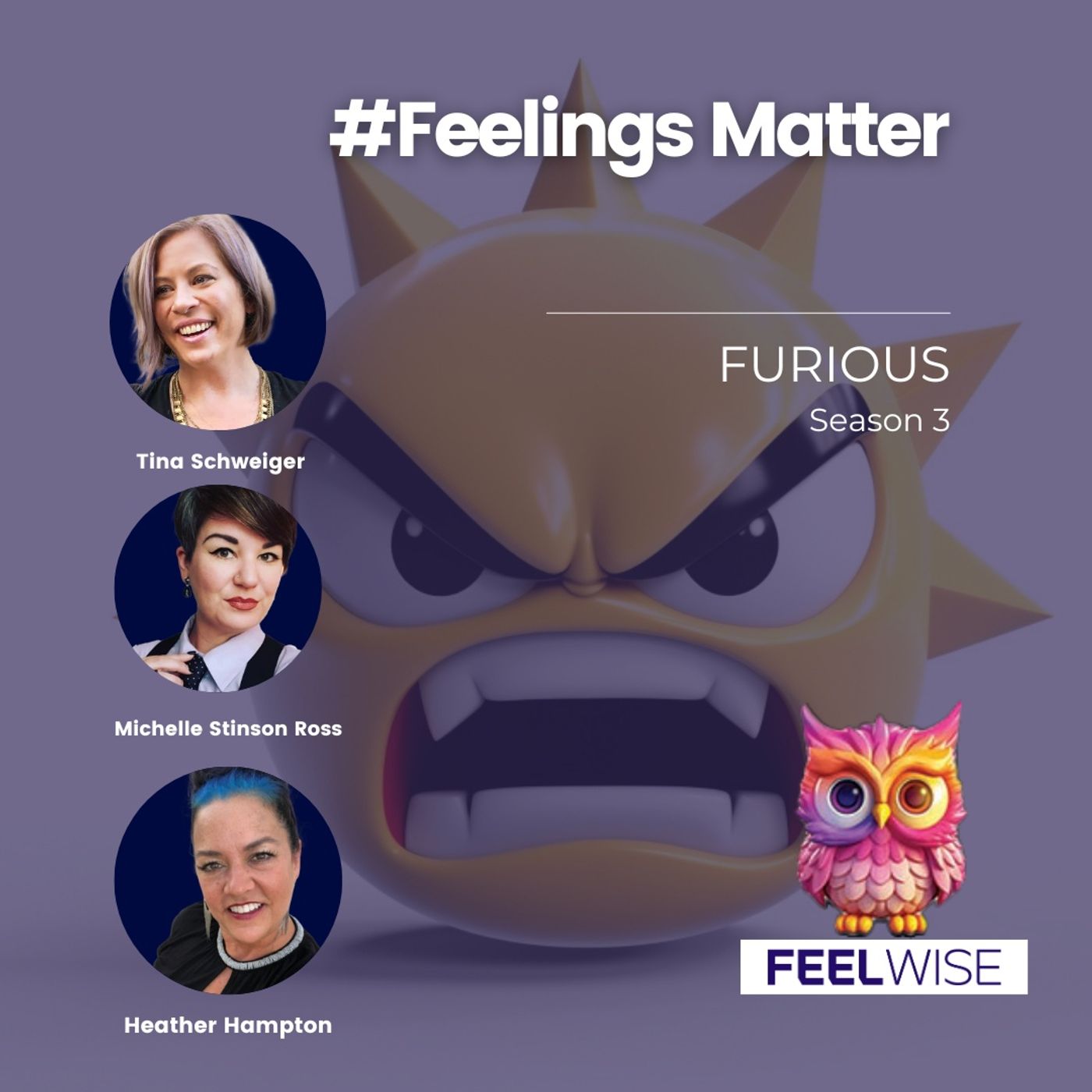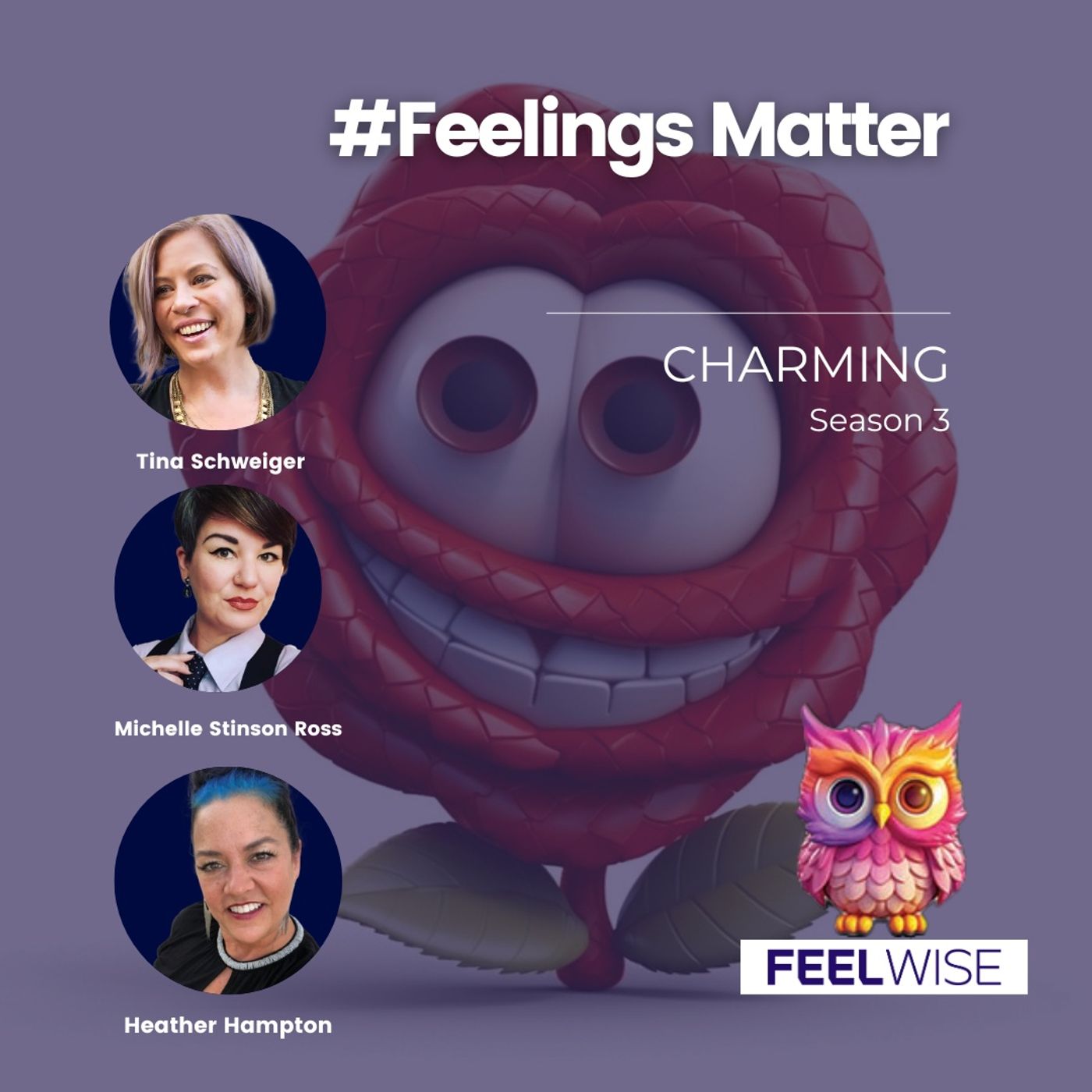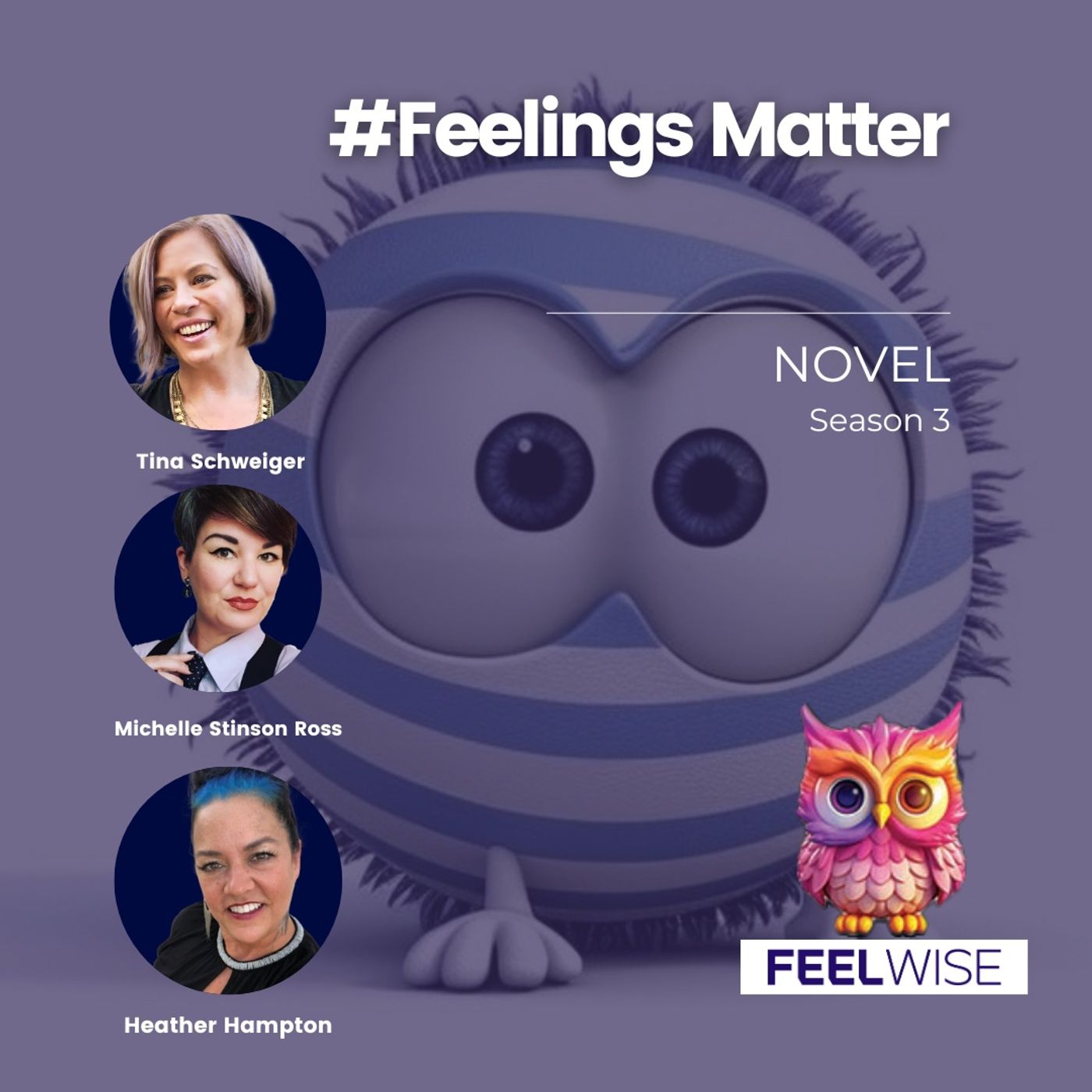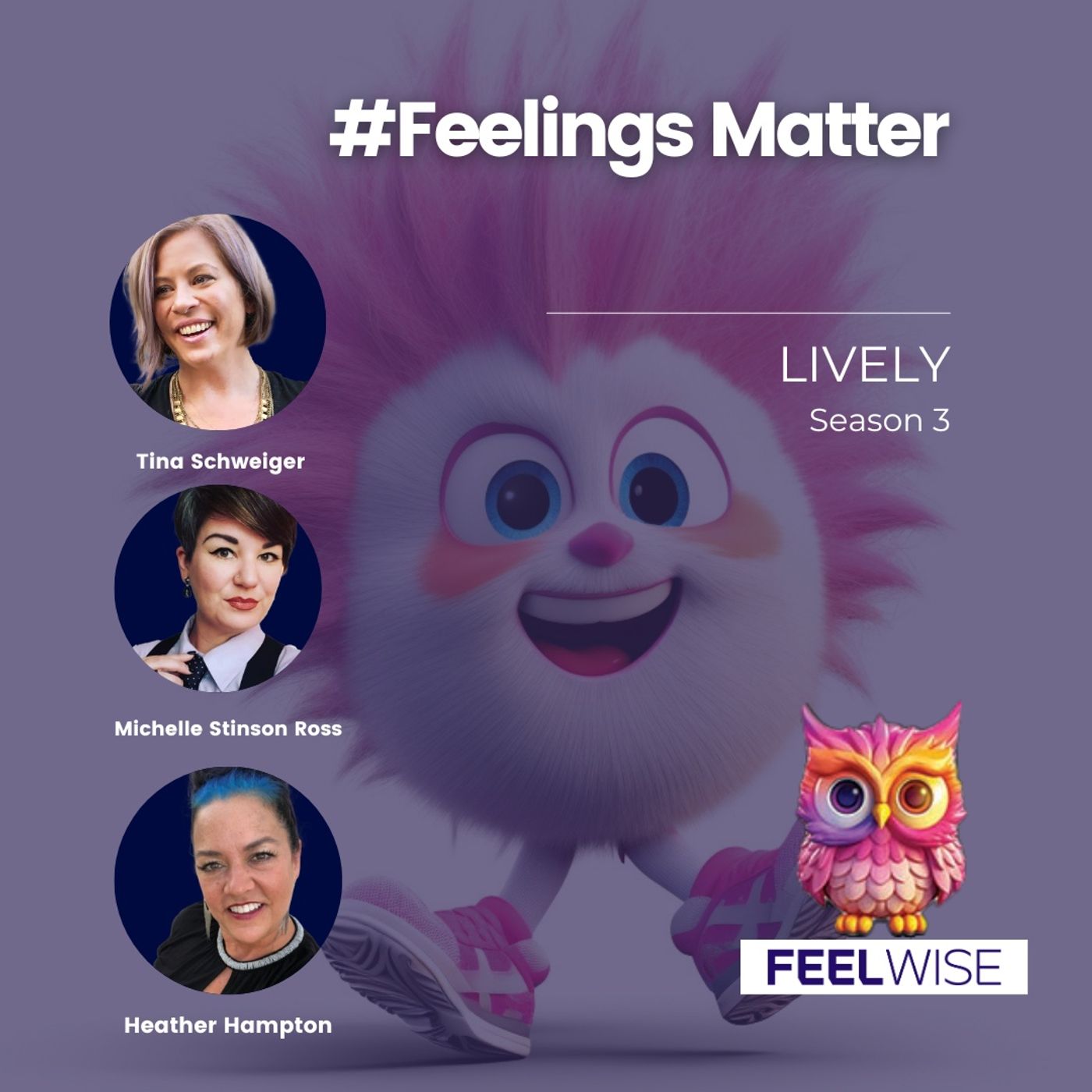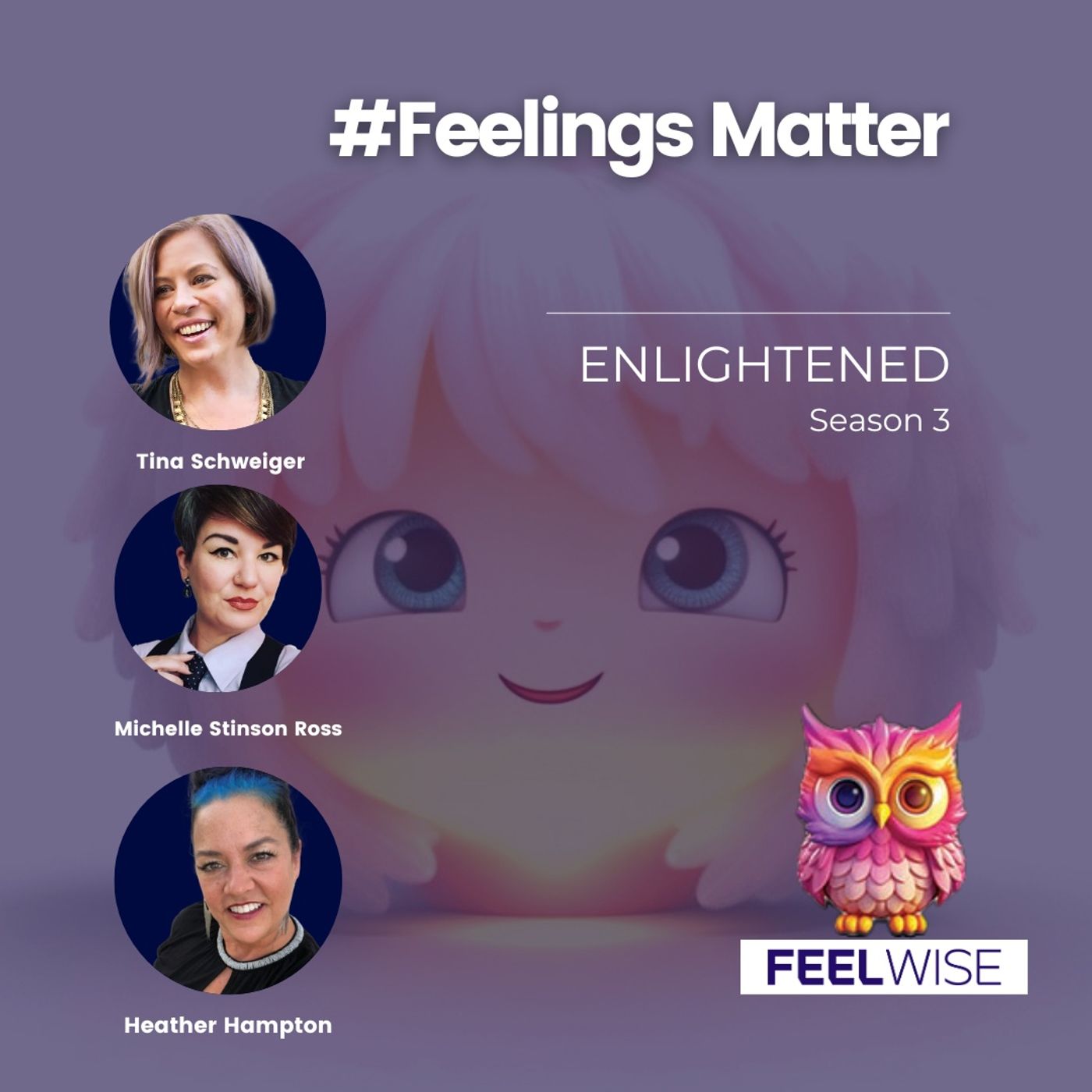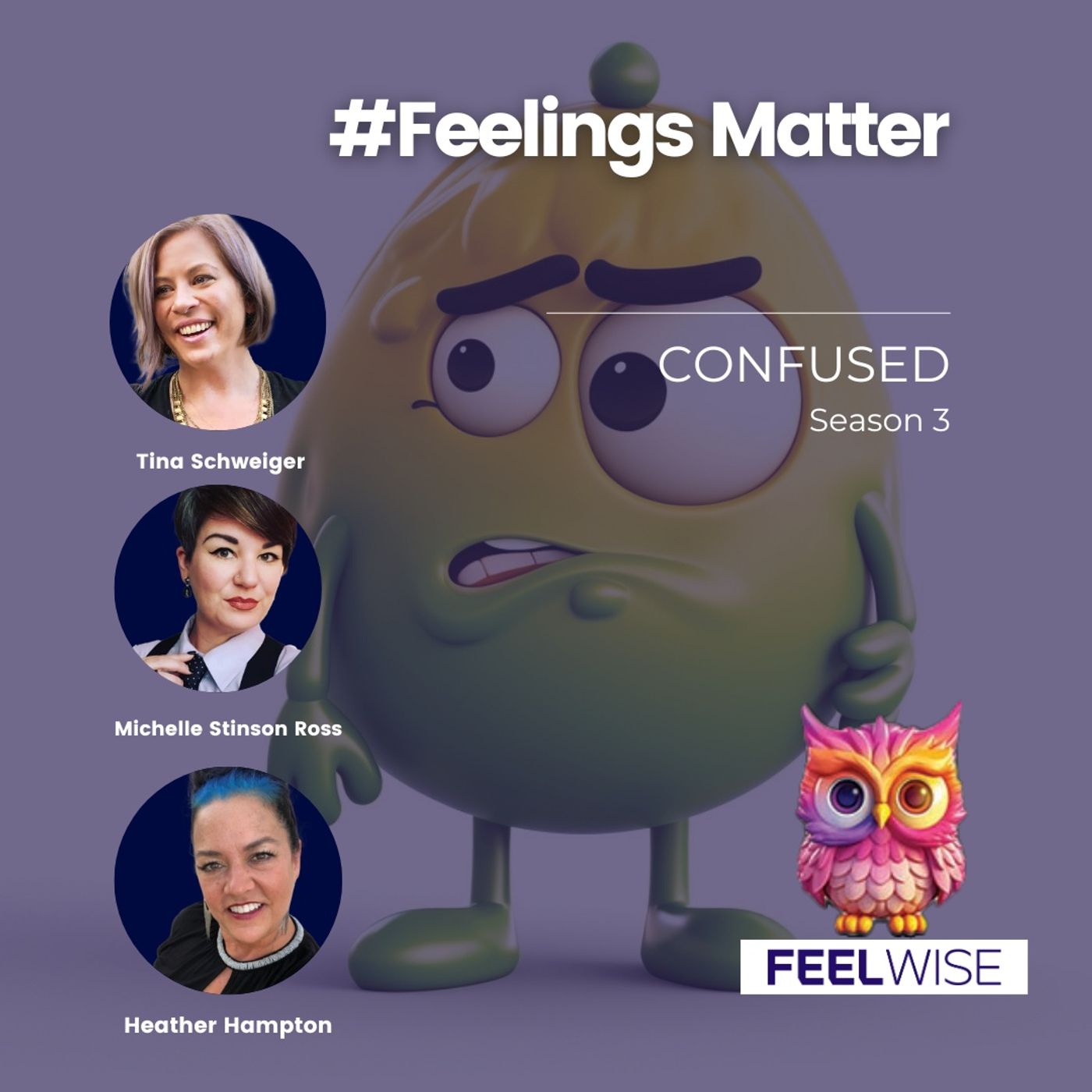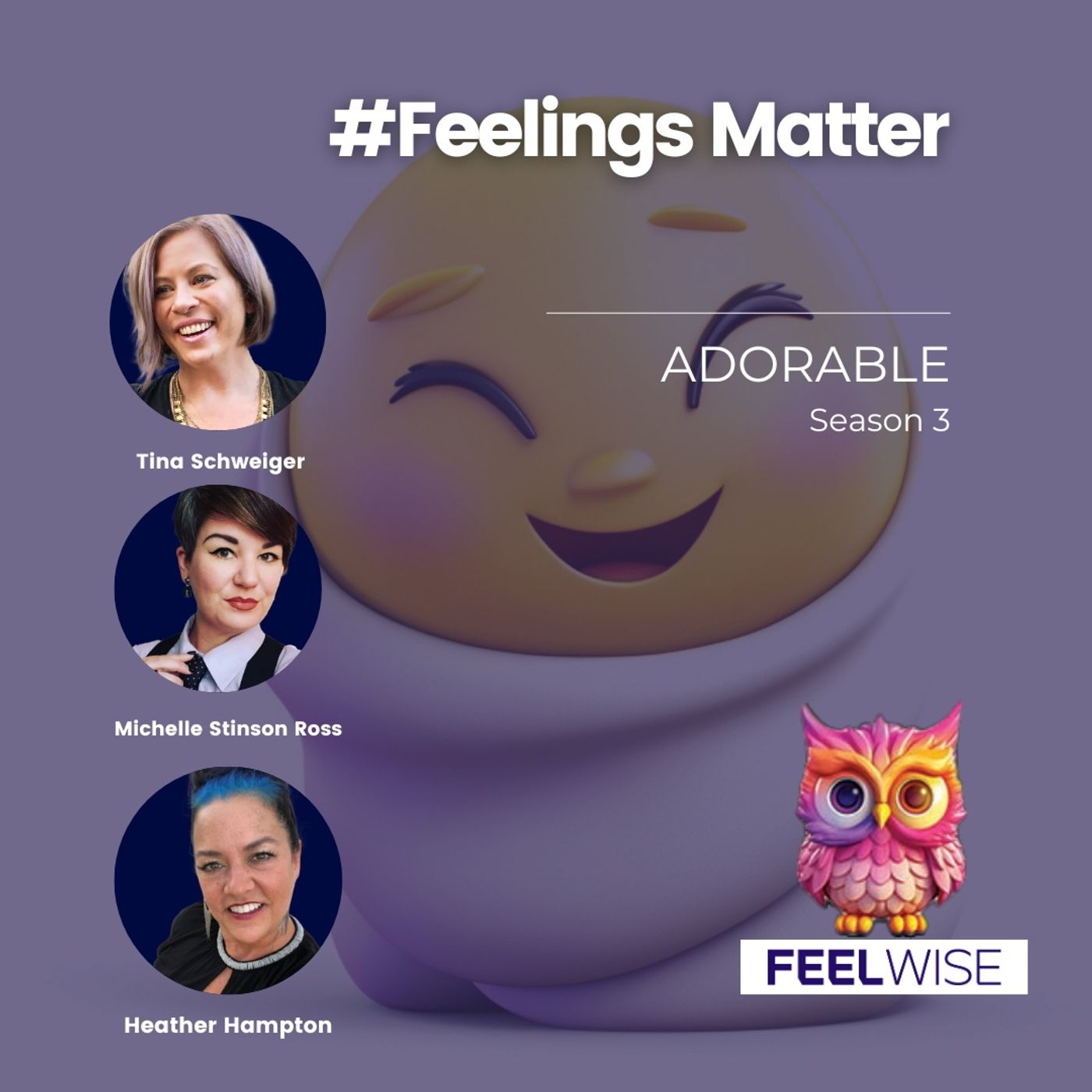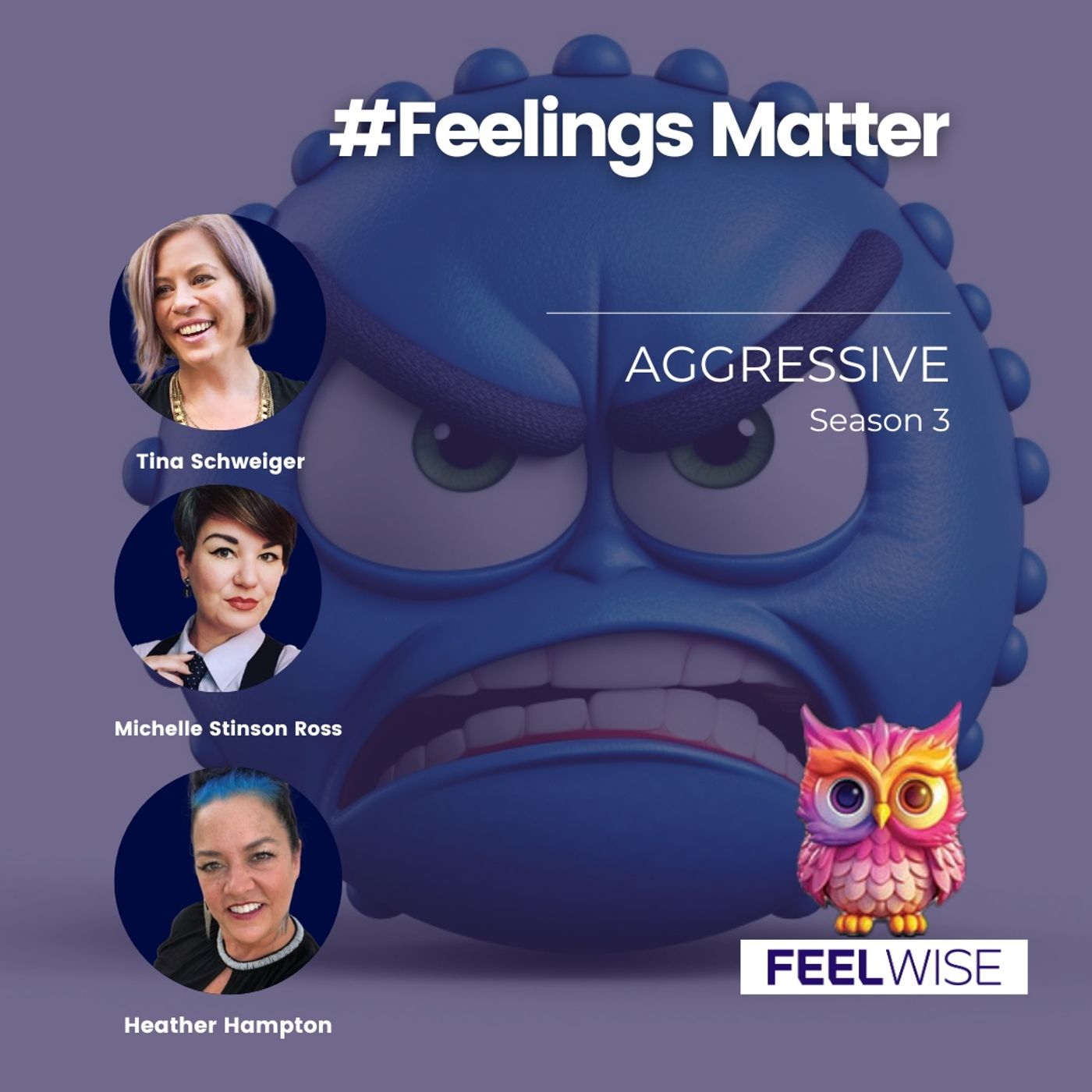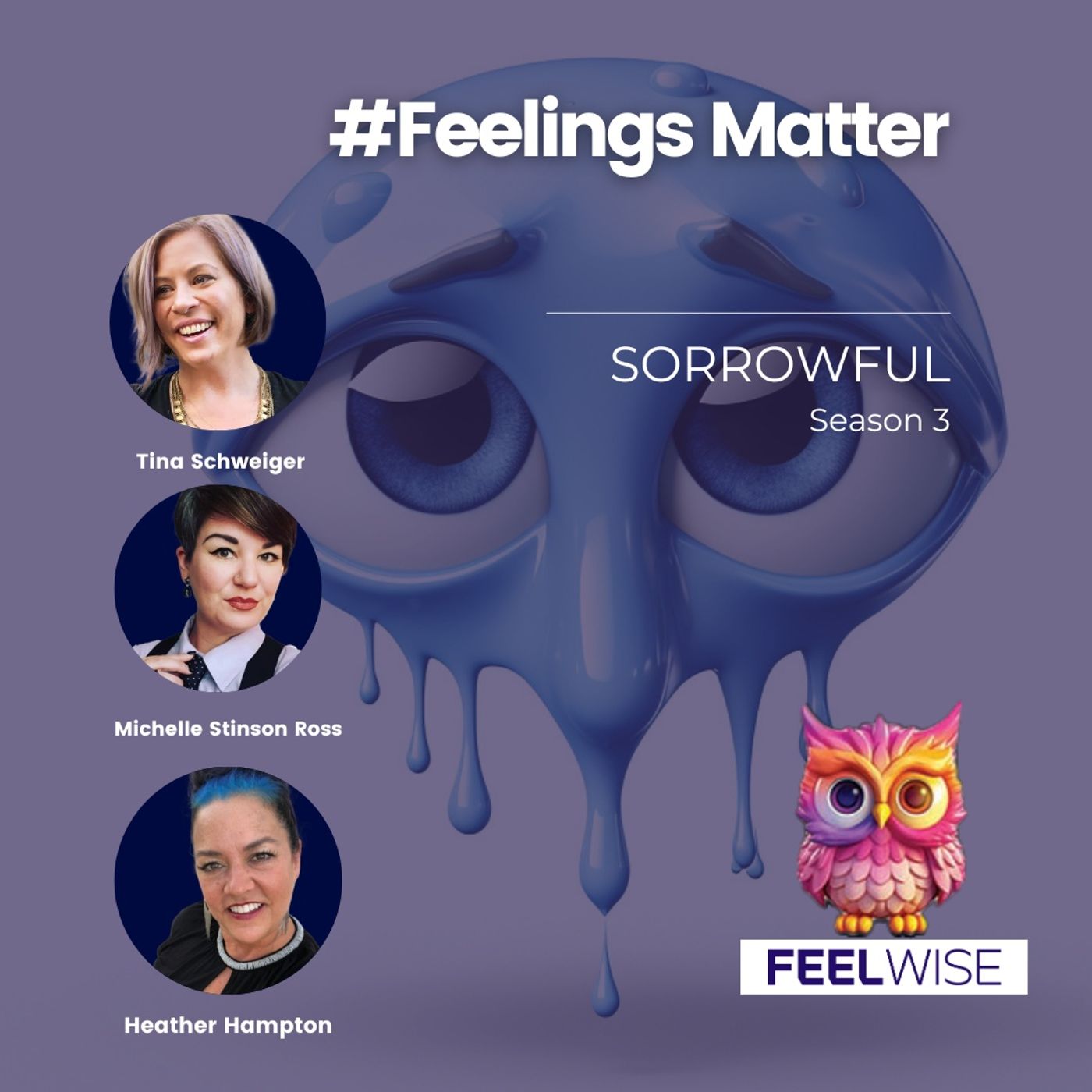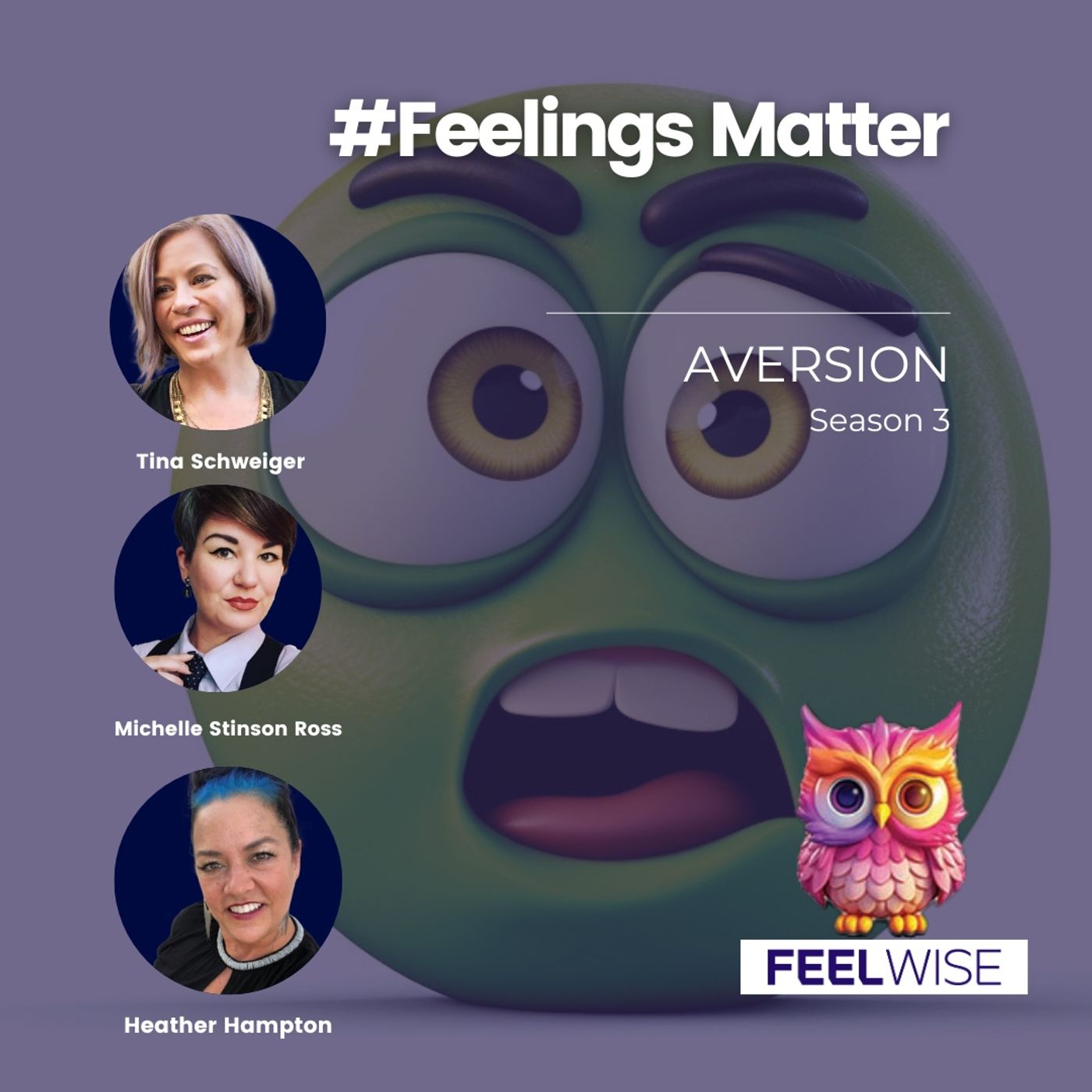Discover Feelings Matter
Feelings Matter

Feelings Matter
Author: Michelle Stinson Ross
Subscribed: 3Played: 47Subscribe
Share
© 2025
Description
#FeelingsMatter - Our mission is to demystify everything about emotions. Helping us all get more comfortable talking about them. Join Tina Schweiger, Heather Hampton, and Michelle Stinson Ross as they unpack a new angle on emotions, draw on the science of the human brain, and delve into the psychology of human nature.
63 Episodes
Reverse
In this episode of #FeelingsMatter, hosts Heather Hampton, Michelle Stinson Ross, and Tina Schweiger explore the emotion of feeling sullen - that experience of being unhappy to the point where it becomes an ongoing mood. The conversation examines sullen as a protective response when we've run out of emotional capacity, the need for processing space when triggered, and how to support both ourselves and others (especially teenagers) when this withdrawn state emerges. The hosts share personal strategies for navigating and respecting the sullen experience. EpisodeHighlights:Heather describes sullen as appearing when something has "peeved you off" to a low simmering level of anger, requiring alone time to process what's bothering you before you might "erupt more" if forced to interact with othersMichelle uses the metaphor of a "Dairy Queen chocolate-dipped cone" to describe sullen - creating a "hard crunchy shell" around herself when she's run out of emotional capacity to deal with people, noting that the coating will eventually "melt and ooze off"Tina connects sullen to being physically stuck or unable to accomplish things due to fatigue or illness, describing it as feeling "mopey" when prevented from getting the dopamine rush of completing tasksThe hosts discuss sullen as common during teenage years due to hormonal changes affecting brain chemistry, offering advice for parents to give space and acknowledgment rather than chasing teenagers for conversation during these moodsThe conversation emphasizes the importance of self-compassion and allowing processing time when experiencing sullen, with Heather noting that being forced to engage while in "fight or flight mode" can lead to hurtful reactions that don't reflect what's really going on internallyPodcast theme music by Dubush Miaw from PixabayThis episode of the #FeelingsMatter Podcast was recorded and produced at MSR Studios in Saint Paul, MN. No reproduction, excerpting, or other use without written permission.This episode is sponsored by FeelWise - bridging the gap between reflection and resilience, offering practical tools to help people overcome obstacles, embrace change, and grow stronger emotionally. https://www.feel-wise.com/Don’t miss a moment of the conversation, subscribe to the show on your favorite podcasting platform
In this episode of #FeelingsMatter, hosts Tina Schweiger, Heather Hampton, and Michelle Stinson Ross explore the emotion of guilt - that feeling of responsibility for wrongdoing, whether or not harm has actually been inflicted. The conversation distinguishes guilt from shame, examines how guilt particularly affects women in society, and shares strategies for reframing guilty thoughts. Tina vulnerably shares a recent experience of standing up for herself with a healthcare provider and the conflicted feelings that followed. Episode Highlights:Tina clarifies the distinction between guilt and shame: "guilt is I did something bad and shame is I'm a bad person because I did something bad," noting that guilt relates to behavior while shame attacks identityThe hosts share Tina's experience with an unprofessional healthcare provider who made inappropriate comments about her appearance, exploring her conflicted feelings about standing up for herself and requesting a refundMichelle identifies guilt as particularly common in the female experience, noting how women are socialized to "don't make a fuss, don't make noise" and be accommodating, leading to guilt when they advocate for themselvesThe conversation explores "overly responsible syndrome" as a generational issue for Gen X women who hold themselves to impossibly high internal standards that others don't expect from themTina shares her strategy for managing guilt through reframing, choosing to focus on how she "probably provided that office a service" rather than dwelling on guilty feelings, and training herself to redirect from guilt to gratitude when her mind returns to self-criticismPodcast theme music by Dubush Miaw from PixabayThis episode of the #FeelingsMatter Podcast was recorded and produced at MSR Studios in Saint Paul, MN. No reproduction, excerpting, or other use without written permission.This episode is sponsored by FeelWise - bridging the gap between reflection and resilience, offering practical tools to help people overcome obstacles, embrace change, and grow stronger emotionally. https://www.feel-wise.com/Don’t miss a moment of the conversation, subscribe to the show on your favorite podcasting platform
In this episode of #FeelingsMatter, hosts Michelle Stinson Ross, Tina Schweiger, and Heather Hampton explore the emotion of indifference - that feeling of having no preference when faced with choices or not caring about something that's happening. The conversation challenges the typical view of indifference as negative, examining how it can sometimes serve as healthy professional detachment or signal relationship problems. The hosts discuss the nuanced role indifference plays in boundaries, relationships, and professional settings.Episode Highlights:Michelle reframes indifference as potentially beneficial in professional settings, sharing how she wished she could be more indifferent when a stressed client tried to transfer their panic to her, noting that "professional indifference" can help maintain healthy boundariesThe hosts connect indifference to Buddhist concepts of detachment, with Tina suggesting that the desire for indifference often stems from wanting to detach from drama that's been imposed on youHeather raises the important question of whether indifference in personal relationships signals a problem that needs addressing, particularly when one partner reacts strongly to something while the other feels indifferentMichelle shares how complete indifference was a clear indicator that her previous marriage was ending, describing it as "purely, I'm indifferent" - neither good nor bad, but simply absent of careThe hosts explore how indifference might lead to contempt if the same situations repeatedly arise, while also questioning whether partners need to give everything the same priority level, suggesting that sometimes indifference reveals that one person's anxiety or stress "resides in you and not in me"Podcast theme music by Dubush Miaw from PixabayThis episode of the #FeelingsMatter Podcast was recorded and produced at MSR Studios in Saint Paul, MN. No reproduction, excerpting, or other use without written permission.This episode is sponsored by FeelWise - bridging the gap between reflection and resilience, offering practical tools to help people overcome obstacles, embrace change, and grow stronger emotionally. https://www.feel-wise.com/Don’t miss a moment of the conversation, subscribe to the show on your favorite podcasting platform
In this episode of #FeelingsMatter, hosts Tina Schweiger, Michelle Stinson Ross, and Heather Hampton explore the emotion of feeling colorful - that sense of being interesting, multifaceted, energetic, and distinctive. The conversation delves into how colorful manifests as both an emotional experience and a personality trait, the connection between color theory and emotions, and why this vibrant feeling lands in the humor category. The hosts share personal stories about how they express their colorful nature through fashion, hair, and creative choices. Episode Highlights:Tina describes feeling colorful while writing a thank-you note with gold paint pen on blue glitter cardboard, explaining how creative expression with vibrant colors brings her self-satisfaction and joy, especially when "sparkles" are involvedHeather reveals that dyeing her hair pink and purple serves as both self-expression and a reminder that there's "something beautiful and effervescent inside" her, even during periods of depression when she may not feel itMichelle connects her colorful wardrobe choices to her personality, noting how she gravitates toward vibrant clothing and uses even black as a base for contrast and impact rather than to hideThe hosts explore Tina's background in color theory and graphic design, learning how colors like McDonald's red and yellow combination are deliberately chosen to create discomfort that encourages quick turnoverTina explains why colorful belongs in the humor category rather than joy or energy, noting that colorful people often have a "silly" quality and don't take themselves too seriously - embodying a "I don't give a crap about what you think because this makes me happy" attitude that celebrates uniqueness without needing approvalPodcast theme music by Dubush Miaw from PixabayThis episode of the #FeelingsMatter Podcast was recorded and produced at MSR Studios in Saint Paul, MN. No reproduction, excerpting, or other use without written permission.This episode is sponsored by FeelWise - bridging the gap between reflection and resilience, offering practical tools to help people overcome obstacles, embrace change, and grow stronger emotionally. https://www.feel-wise.com/Don’t miss a moment of the conversation, subscribe to the show on your favorite podcasting platform
In this episode of #FeelingsMatter, hosts Michelle Stinson Ross, Tina Schweiger, and Heather Hampton explore the emotion of feeling affectionate - that warm regard for another person or animal, characterized by loving and fond feelings. The conversation delves into the relationship between affection and physical touch, the biochemical aspects of affectionate feelings, and how past trauma can complicate our ability to express and receive affection. The hosts share vulnerable personal experiences about navigating affection with consent and emotional intelligence. EpisodeHighlights:Michelle describes the visual representation of affection as looking "a little stoned," connecting this to the dopamine and "love chemicals" that create a natural high when we experience affectionate feelings toward othersHeather shares how physical touch is central to her experience of affection, noting that while you can feel affectionate toward someone from a distance, expressing that affection is difficult without being physically presentTina vulnerably discusses her anxiety around physical touch due to childhood emotional neglect and past abuse, explaining how this creates a challenging conflict between craving human connection and experiencing physical discomfort when touchedThe hosts explore the distinction between feeling affection and expressing it, with Michelle emphasizing the importance of consent when offering physical comfort, always asking "Would you like a hug?" before touching othersTina shares a powerful story about comforting a delivery worker who was grieving, illustrating how emotional intelligence allows us to step outside our comfort zones to meet others' needs, and reflects on how she's grown from losing a friendship years ago due to not understanding how to show affection during difficult timesPodcast theme music by Dubush Miaw from PixabayThis episode of the #FeelingsMatter Podcast was recorded and produced at MSR Studios in Saint Paul, MN. No reproduction, excerpting, or other use without written permission.This episode is sponsored by FeelWise - bridging the gap between reflection and resilience, offering practical tools to help people overcome obstacles, embrace change, and grow stronger emotionally. https://www.feel-wise.com/Don’t miss a moment of the conversation, subscribe to the show on your favorite podcasting platform
In this episode of #FeelingsMatter, hosts Heather Hampton, Michelle Stinson Ross, and Tina Schweiger explore the emotion of feeling moral - that sense of being connected to principles of right and wrong, especially regarding teaching right behavior. The conversation examines how moral feelings differ from other emotions because they're deeply rooted in our conditioning and values, making them particularly challenging to examine objectively. The hosts discuss how moral convictions can both guide positive action and fuel destructive conflicts.Episode Highlights:Heather describes moral feelings as deeply tied to personal values and sense of self, making them more difficult to examine from different perspectives compared to other emotions, using current deportation policies as an example of how moral differences create unbridgeable gaps between peopleMichelle distinguishes moral emotions from other feelings by noting they're based more on conditioning, upbringing, and cultural training rather than biochemistry or neurological wiring, requiring us to acknowledge how our responses are shaped by what we've been taughtTina raises the provocative question of whether moral feelings might be "our deadliest emotion," pointing out that religious persecution and wars often involve both sides believing they're morally rightThe hosts discuss how moral feelings can interfere with kindness and empathy, with phrases like "get off your high horse" revealing how moral positioning can become judgmental rather than genuinely principledThe conversation concludes with practical approaches to examining moral feelings, including using the "why ladder" technique to get to the root of beliefs and practicing self-acceptance to distinguish between core identity and potentially outdated belief systemsPodcast theme music by Dubush Miaw from PixabayThis episode of the #FeelingsMatter Podcast was recorded and produced at MSR Studios in Saint Paul, MN. No reproduction, excerpting, or other use without written permission.This episode is sponsored by FeelWise - bridging the gap between reflection and resilience, offering practical tools to help people overcome obstacles, embrace change, and grow stronger emotionally. https://www.feel-wise.com/Don’t miss a moment of the conversation, subscribe to the show on your favorite podcasting platform
In this episode of #FeelingsMatter, hosts Michelle Stinson Ross, Tina Schweiger, and Heather Hampton explore the emotion of worry - that feeling of being troubled or having a mind busy with anxiety or doubt. The conversation examines worry as primarily a mental rather than physical experience, its relationship to control and choice, and how it differs from anxiety. The hosts share contrasting perspectives on worry, with some experiencing it frequently while others find it largely absent from their emotional landscape.Episode Highlights:Heather notes how the visual representation of worry shows the character looking off into the distance rather than at the viewer, illustrating how worry takes us out of the present moment and focuses on an unknown futureHeather shares her approach to worry using the phrase "worry doesn't have a place in a plan," explaining how she gathers information before deciding if something is worth worrying about, and how having a plan eliminates the need for worryTina theorizes that worry can become addictive because it creates an illusion of power or control over situations we actually cannot control, suggesting people can become "worry warts" as part of their personalityThe hosts contrast worry (primarily mental rumination) with anxiety (more physical sensations), and explore how worry represents "over-engaging in choice" while exasperation comes from lack of agencyHeather offers a surprising perspective that her intimate relationship with depression may actually make her "immune" to worry, since she already has a pessimistic worldview and doesn't need to add more negative thinking on top of that baselinePodcast theme music by Dubush Miaw from PixabayThis episode of the #FeelingsMatter Podcast was recorded and produced at MSR Studios in Saint Paul, MN.Copyright 2025, all rights reserved. No reproduction, excerpting, or other use without written permission.This episode is sponsored by FeelWise - bridging the gap between reflection and resilience, offering practical tools to help people overcome obstacles, embrace change, and grow stronger emotionally. https://www.feel-wise.com/Don’t miss a moment of the conversation, subscribe to the show on your favorite podcasting platformPodcast theme music by Dubush Miaw from PixabayThis episode of the #FeelingsMatter Podcast was recorded and produced at MSR Studios in Saint Paul, MN. No reproduction, excerpting, or other use without written permission.This episode is sponsored by FeelWise - bridging the gap between reflection and resilience, offering practical tools to help people overcome obstacles, embrace change, and grow stronger emotionally. https://www.feel-wise.com/Don’t miss a moment of the conversation, subscribe to the show on your favorite podcasting platform
In this episode of #FeelingsMatter, hosts Michelle Stinson Ross, Tina Schweiger, and Heather Hampton explore the emotion of feeling glad - that sense of being pleased, happy, and gratified. The conversation delves into how gladness differs from related emotions like happiness and joy, examining its unique combination of gratitude and surprise. The hosts discuss the sustaining nature of gladness compared to more fleeting emotions and emphasize the importance of recognizing these positive feelings when they occur.Episode Highlights:Michelle defines gladness as "the intersection of joy and gratitude," distinguishing it from simple gratitude (being grateful for paid bills doesn't spark gladness) and noting how relationships with friends create true gladness in her lifeTina connects gladness to unexpected pleasant encounters, using the phrase "I am so glad that I ran into you" as an example of how gladness often contains an element of surprise mixed with gratitude and joyThe hosts distinguish gladness from happiness, describing happiness as more ephemeral and fragile (like a balloon that could pop), while gladness has a "longer shelf life" and is more nourishing to the soulHeather notes that while happiness can be more superficial and driven by external circumstances, gladness has more substance because of its gratitude component, which helps ground it and make it sustainingMichelle emphasizes that the goal isn't necessarily to have more positive emotions in our lives, but to become more aware of when we're experiencing them, noting that we often miss moments of gladness rather than lacking them entirelyPodcast theme music by Dubush Miaw from PixabayThis episode of the #FeelingsMatter Podcast was recorded and produced at MSR Studios in Saint Paul, MN.Copyright 2025, all rights reserved. No reproduction, excerpting, or other use without written permission.This episode is sponsored by FeelWise - bridging the gap between reflection and resilience, offering practical tools to help people overcome obstacles, embrace change, and grow stronger emotionally. https://www.feel-wise.com/Don’t miss a moment of the conversation, subscribe to the show on your favorite podcasting platformPodcast theme music by Dubush Miaw from PixabayThis episode of the #FeelingsMatter Podcast was recorded and produced at MSR Studios in Saint Paul, MN. No reproduction, excerpting, or other use without written permission.This episode is sponsored by FeelWise - bridging the gap between reflection and resilience, offering practical tools to help people overcome obstacles, embrace change, and grow stronger emotionally. https://www.feel-wise.com/Don’t miss a moment of the conversation, subscribe to the show on your favorite podcasting platform
In this episode of #FeelingsMatter, hosts Michelle Stinson Ross, Tina Schweiger, and Heather Hampton explore the emotion of exasperation - that feeling of having your patience greatly tested and feeling super annoyed or overwhelmed. Tina vulnerably shares her current experience of exasperation in real time, leading to an authentic discussion about how small things can feel overwhelming when we're already stressed, and how this emotion often signals that our boundaries or sense of agency have been compromised. The hosts examine generational and cultural factors that may contribute to this feeling.Episode Highlights:Tina shares her current state of exasperation, triggered by something as simple as not being able to find dry erase markers that were "right in front of me the whole time," illustrating how small things become overwhelming when we're already dealing with persistent stressorsThe hosts identify exasperation as often occurring when circumstances take away our sense of choice, control, or agency, with physical symptoms including tension, headaches, and fatigueHeather connects exasperation to boundary violations, sharing her experience caring for someone with Alzheimer's where emergency situations (like a lost dog) force her to drop everything despite feeling like she can't say noMichelle suggests this may be a generational issue for Gen Xers, who were raised with "no pain, no gain" mentality and are now in the "sandwich generation," caring for both children and aging parents while lacking self-care skillsThe conversation reveals how exasperation can evolve into resentment when the same circumstances repeatedly occur, and how simply having someone "bear witness to your emotions" and talk them through can be powerfully healingPodcast theme music by Dubush Miaw from PixabayThis episode of the #FeelingsMatter Podcast was recorded and produced at MSR Studios in Saint Paul, MN.Copyright 2025, all rights reserved. No reproduction, excerpting, or other use without written permission.This episode is sponsored by FeelWise - bridging the gap between reflection and resilience, offering practical tools to help people overcome obstacles, embrace change, and grow stronger emotionally. FeelWise | Turn Emotions into Your Superpower ✨💫Don’t miss a moment of the conversation, subscribe to the show on your favorite podcasting platformPodcast theme music by Dubush Miaw from PixabayThis episode of the #FeelingsMatter Podcast was recorded and produced at MSR Studios in Saint Paul, MN. No reproduction, excerpting, or other use without written permission.This episode is sponsored by FeelWise - bridging the gap between reflection and resilience, offering practical tools to help people overcome obstacles, embrace change, and grow stronger emotionally. https://www.feel-wise.com/Don’t miss a moment of the conversation, subscribe to the show on your favorite podcasting platform
In this episode of #FeelingsMatter, hosts Michelle Stinson Ross, Tina Schweiger, and Heather Hampton explore the emotion of ambivalence - feeling two opposite feelings or attitudes at the same time, or simply feeling indecisive. The conversation distinguishes ambivalence from indifference and examines how this emotion can manifest both as a symptom of depression and as decision fatigue. The hosts discuss how ambivalence can put people on the precipice of isolation and share strategies for moving through this challenging emotional state.Episode Highlights:Heather describes experiencing ambivalence in two ways: as part of depression where she simply doesn't care about outcomes, and more commonly through decision fatigue when overwhelmed by daily responsibilities and unable to make even simple choices like where to eat dinnerMichelle connects ambivalence to the "mental load of caregiving" that drives people to a point where they refuse to make any more decisions, noting there's a difference between "can't" and "won't" make decisions, with the latter tinged with irritationTina admits she struggles with holding space for people experiencing ambivalence because indecision is a pet peeve for her, honestly sharing that she might not be the right person to bring ambivalence toThe hosts discuss hope as the recommended mindset for ambivalence, with Tina suggesting that sometimes you can "trick your way out" of the emotional space by envisioning a positive future rather than trying to think your way outMichelle shares the personal significance of her Phoenix tattoo as a symbol of hope and resilience, explaining how it reminds her that she has consistently risen from challenging situations and can do so again, providing evidence that "you can" rather than "you can't" get through difficult timesPodcast theme music by Dubush Miaw from PixabayThis episode of the #FeelingsMatter Podcast was recorded and produced at MSR Studios in Saint Paul, MN.Copyright 2025, all rights reserved. No reproduction, excerpting, or other use without written permission.This episode is sponsored by FeelWise - bridging the gap between reflection and resilience, offering practical tools to help people overcome obstacles, embrace change, and grow stronger emotionally. https://www.feel-wise.com/Don’t miss a moment of the conversation, subscribe to the show on your favorite podcasting platformPodcast theme music by Dubush Miaw from PixabayThis episode of the #FeelingsMatter Podcast was recorded and produced at MSR Studios in Saint Paul, MN. No reproduction, excerpting, or other use without written permission.This episode is sponsored by FeelWise - bridging the gap between reflection and resilience, offering practical tools to help people overcome obstacles, embrace change, and grow stronger emotionally. https://www.feel-wise.com/Don’t miss a moment of the conversation, subscribe to the show on your favorite podcasting platform
In this episode of #FeelingsMatter, hosts Michelle Stinson Ross, Tina Schweiger, and Heather Hampton explore the intense emotion of feeling furious - that state of intense anger, actively raging, or feeling violent. The conversation examines fury as an "amygdala hijack" that can signal the need for significant change and growth, while also offering practical strategies for managing this overwhelming emotion. The hosts share personal experiences with fury and discuss techniques for de-escalation when this intense emotion emerges.Episode Highlights:Michelle describes fury as rare for her but connected to feelings of helplessness when she has no control over a harmful situation, noting that for her it takes "something excessive" to reach this level of intense angerTina explains fury as a complete "amygdala hijack" that can actually precede significant personal growth, suggesting that when you're helpless enough to feel furious, it can drive you to realize what you cannot control and need to acceptHeather shares that she rarely experiences fury in daily life except while driving (where her car serves as a safe space to express strong emotions), and emphasizes that anger emotions often signal core beliefs being challengedThe hosts discuss practical de-escalation strategies, including the "exit sign" visualization technique for removing yourself from volatile situations, and Tina shares a road rage story that illustrates how choosing not to engage can defuse dangerous confrontationsMichelle introduces the "whisper technique" for managing fury - deliberately speaking in whispers forces others to calm down to hear you while simultaneously helping regulate your own nervous system and buying time to regain clarityPodcast theme music by Dubush Miaw from PixabayThis episode of the #FeelingsMatter Podcast was recorded and produced at MSR Studios in Saint Paul, MN.Copyright 2025, all rights reserved. No reproduction, excerpting, or other use without written permission.This episode is sponsored by FeelWise - bridging the gap between reflection and resilience, offering practical tools to help people overcome obstacles, embrace change, and grow stronger emotionally. https://www.feel-wise.com/Don’t miss a moment of the conversation, subscribe to the show on your favorite podcasting platformPodcast theme music by Dubush Miaw from PixabayThis episode of the #FeelingsMatter Podcast was recorded and produced at MSR Studios in Saint Paul, MN. No reproduction, excerpting, or other use without written permission.This episode is sponsored by FeelWise - bridging the gap between reflection and resilience, offering practical tools to help people overcome obstacles, embrace change, and grow stronger emotionally. https://www.feel-wise.com/Don’t miss a moment of the conversation, subscribe to the show on your favorite podcasting platform
In this episode of #FeelingsMatter, hosts Michelle Stinson Ross, Tina Schweiger, and Heather Hampton explore the emotion of feeling charming - that pleasant feeling with an air of charisma that creates connection with others. The conversation examines the distinction between authentic and inauthentic charm, how charm functions in relationships and performance settings, and the positive dynamic that can emerge when people mutually experience this delightful emotion. The hosts discuss charm as both something we feel within ourselves and something we experience from others.Episode Highlights:Tina introduces charming as feeling "pleasant with an air of charisma," using the old-fashioned greeting "I'm charmed" as an example, and questions whether charm is a natural state or something crafted to influence othersMichelle explores the difference between authentic and manipulative charm, sharing experiences of initially finding someone charming only to discover they were "working extra hard" to win her over, leading to disappointment when the charm disappearedHeather describes authentic charm as feeling adjacent to "flow" - something that comes naturally without working hard, like being inspired in the moment or genuinely wanting to connect with someoneTina observes that charm can create "positive escalation" where feeling charmed by someone makes them feel more charming in return, creating an expanding "dance of delight" between peopleMichelle connects charm to public speaking and performance, noting how successful speakers and performers (including Tina's stage presence) use charm to create connection with audiences, describing it as "the intersection of charisma and connection"Podcast theme music by Dubush Miaw from PixabayThis episode of the #FeelingsMatter Podcast was recorded and produced at MSR Studios in Saint Paul, MN.Copyright 2025, all rights reserved. No reproduction, excerpting, or other use without written permission.This episode is sponsored by FeelWise - bridging the gap between reflection and resilience, offering practical tools to help people overcome obstacles, embrace change, and grow stronger emotionally. https://www.feel-wise.com/Don’t miss a moment of the conversation, subscribe to the show on your favorite podcasting platformPodcast theme music by Dubush Miaw from PixabayThis episode of the #FeelingsMatter Podcast was recorded and produced at MSR Studios in Saint Paul, MN. No reproduction, excerpting, or other use without written permission.This episode is sponsored by FeelWise - bridging the gap between reflection and resilience, offering practical tools to help people overcome obstacles, embrace change, and grow stronger emotionally. https://www.feel-wise.com/Don’t miss a moment of the conversation, subscribe to the show on your favorite podcasting platform
In this episode of #FeelingsMatter, hosts Tina Schweiger, Michelle Stinson Ross, and Heather Hampton explore the emotion of feeling novel - that sense of having no precedent or experiencing something completely new. The conversation examines how novel differs from fear of the unknown, the importance of actively seeking novelty as we age, and how this childlike sense of wonder can contribute to innovation, creativity, and compassion. The hosts share personal examples of experiencing novelty and discuss how to cultivate this positive emotion in daily life.Episode Highlights:Tina describes novel as a "childlike sense of wonder" that becomes harder to cultivate as we age and get stuck in patterns, emphasizing the importance of actively seeking new experiences to foster innovation and creativityHeather distinguishes between encountering novel moments unexpectedly (like seeing a wild animal on a hike) and deliberately seeking them out (like watching "Love on the Spectrum" to better understand autism after meeting a colleague on the spectrum)Michelle highlights the key distinction that novel is "the delight in the unfamiliar rather than the discomfort of the unfamiliar," noting how travel provides excellent opportunities for experiencing novelty through different architecture, culture, language, and foodThe hosts note that when you identify you're feeling novel, the recommended action is simply to pause and recognize the positive aspects of the moment - the delight and enlightenment happening within the unknown experienceTina connects novel to humor, explaining that something must be novel (catching us by surprise) to be funny, and emphasizes that novel is an emotion you want others to "catch" from you, promoting a mindset of compassion when experiencing this childlike wonderPodcast theme music by Dubush Miaw from PixabayThis episode of the #FeelingsMatter Podcast was recorded and produced at MSR Studios in Saint Paul, MN.Copyright 2025, all rights reserved. No reproduction, excerpting, or other use without written permission.This episode is sponsored by FeelWise - bridging the gap between reflection and resilience, offering practical tools to help people overcome obstacles, embrace change, and grow stronger emotionally. https://www.feel-wise.com/Don’t miss a moment of the conversation, subscribe to the show on your favorite podcasting platformPodcast theme music by Dubush Miaw from PixabayThis episode of the #FeelingsMatter Podcast was recorded and produced at MSR Studios in Saint Paul, MN. No reproduction, excerpting, or other use without written permission.This episode is sponsored by FeelWise - bridging the gap between reflection and resilience, offering practical tools to help people overcome obstacles, embrace change, and grow stronger emotionally. https://www.feel-wise.com/Don’t miss a moment of the conversation, subscribe to the show on your favorite podcasting platform
In this episode of #FeelingsMatter, hosts Michelle Stinson Ross, Tina Schweiger, and Heather Hampton explore the emotion of feeling lively - that sensation of being full of life and energetic. The conversation reveals how introversion and extroversion influence experiences of liveliness, using their recent conference attendance as a case study. The hosts discuss how to harness lively energy when it appears and emphasize the contagious nature of this positive emotion.Episode Highlights:Michelle describes feeling lively at their recent conference while working the expo hall floor, noting how as an extrovert she was energized by constant interaction with curious attendees despite being on her feet for long periodsHeather contrasts her experience as an introvert who found the conference draining but felt most lively during an intimate lunch conversation with colleagues, illustrating how introverts typically need smaller, deeper connections to feel energizedTina shares her challenge with sensory overload at the conference, describing feeling "overwhelmed and panic" rather than lively in large crowds, but noting she becomes lively after recovery through one-on-one conversations and reflectionThe hosts recommend using lively energy purposefully when it appears - tackling tasks you've been putting off, making phone calls that require energy, or engaging in creative or athletic endeavors like going to the gymHeather emphasizes that lively energy is "strongly positive" and contagious, with the hosts agreeing that sharing this energy through smiles and random acts of kindness is a responsibility, noting that "kindness is the mindset for lively"Podcast theme music by Dubush Miaw from PixabayThis episode of the #FeelingsMatter Podcast was recorded and produced at MSR Studios in Saint Paul, MN.Copyright 2025, all rights reserved. No reproduction, excerpting, or other use without written permission.This episode is sponsored by FeelWise - bridging the gap between reflection and resilience, offering practical tools to help people overcome obstacles, embrace change, and grow stronger emotionally. https://www.feel-wise.com/Don’t miss a moment of the conversation, subscribe to the show on your favorite podcasting platformPodcast theme music by Dubush Miaw from PixabayThis episode of the #FeelingsMatter Podcast was recorded and produced at MSR Studios in Saint Paul, MN. No reproduction, excerpting, or other use without written permission.This episode is sponsored by FeelWise - bridging the gap between reflection and resilience, offering practical tools to help people overcome obstacles, embrace change, and grow stronger emotionally. https://www.feel-wise.com/Don’t miss a moment of the conversation, subscribe to the show on your favorite podcasting platform
In this episode of #FeelingsMatter, hosts Heather Hampton, Michelle Stinson Ross, and Tina Schweiger explore the emotion of feeling enlightened - that sudden feeling of understanding, awareness, or wisdom about something or someone. The conversation delves into the difference between learning and enlightenment, how enlightenment drives innovation and creativity, and the role this emotion can play in professional settings. The hosts share personal experiences of enlightenment and discuss how it connects to empathy and holding space for others.Episode Highlights:Heather describes enlightenment as those magical moments when "several things that you know or have learned come together in a way that you've never thought about," creating connections that no one has ever explained to you beforeMichelle distinguishes enlightenment from regular learning, noting that while you can't force enlightenment, you can create conditions for it by actively working toward learning new skills and pulling different aspects of your life togetherTina describes enlightenment as "finding the light from inside yourself," contrasting it with inspiration which typically comes from external sources, and shares how she often wakes up with new viewpoints or ideas that seem to arrive unexpectedlyThe hosts connect enlightenment to workplace innovation, with Tina explaining how Feel Wise came from moments of enlightenment and describing these moments as "shoots" in a game of shoots and ladders that propel innovation forward fasterThe conversation concludes with insights about how enlightenment connects to empathy - when you're truly in tune with yourself through enlightenment, you're better positioned to hold space for others and honor their experiences respectfullyPodcast theme music by Dubush Miaw from PixabayThis episode of the #FeelingsMatter Podcast was recorded and produced at MSR Studios in Saint Paul, MN.Copyright 2025, all rights reserved. No reproduction, excerpting, or other use without written permission.This episode is sponsored by FeelWise - bridging the gap between reflection and resilience, offering practical tools to help people overcome obstacles, embrace change, and grow stronger emotionally. https://www.feel-wise.com/Don’t miss a moment of the conversation, subscribe to the show on your favorite podcasting platformPodcast theme music by Dubush Miaw from PixabayThis episode of the #FeelingsMatter Podcast was recorded and produced at MSR Studios in Saint Paul, MN. No reproduction, excerpting, or other use without written permission.This episode is sponsored by FeelWise - bridging the gap between reflection and resilience, offering practical tools to help people overcome obstacles, embrace change, and grow stronger emotionally. https://www.feel-wise.com/Don’t miss a moment of the conversation, subscribe to the show on your favorite podcasting platform
In this episode of #FeelingsMatter, hosts Michelle Stinson Ross, Tina Schweiger, and Heather Hampton explore the emotion of confusion - that feeling of being bewildered, unclear, or unsure what to do. The conversation examines whether confusion is primarily a thinking state or an emotion, how people typically respond to feeling confused, and how confusion can manifest in relationships. The hosts also discuss the concerning connection between persistent confusion and manipulative relationship dynamics, offering resources and insights for healthier responses to this common emotion.Episode Highlights:Tina suggests confusion blends thinking and feeling, noting that people often say "I am confused" (active state) rather than "I feel confused," and observes it can trigger mild anger similar to frustrationThe hosts contrast two common responses to confusion: either giving up ("throwing up your hands") which often involves negative self-judgment, or approaching it with curiosity and optimismMichelle shares that her deepest experiences of emotional confusion occur in relationships, particularly when someone says one thing but behaves differently, making it difficult to understand what's trueThe conversation takes a serious turn as the hosts discuss the "weaponization of confusion" in narcissistic relationships, with Michelle noting that frequent confusion in one specific relationship may be a warning sign of manipulation or gaslightingTina recommends resources for handling confusion more effectively, including "The Four Agreements" (particularly "not making assumptions" and asking questions) and Byron Katie's "Loving What Is," which helps with accepting uncertaintyPodcast theme music by Dubush Miaw from PixabayThis episode of the #FeelingsMatter Podcast was recorded and produced at MSR Studios in Saint Paul, MN.Copyright 2025, all rights reserved. No reproduction, excerpting, or other use without written permission.This episode is sponsored by FeelWise - bridging the gap between reflection and resilience, offering practical tools to help people overcome obstacles, embrace change, and grow stronger emotionally. https://www.feel-wise.com/Don’t miss a moment of the conversation, subscribe to the show on your favorite podcasting platformPodcast theme music by Dubush Miaw from PixabayThis episode of the #FeelingsMatter Podcast was recorded and produced at MSR Studios in Saint Paul, MN. No reproduction, excerpting, or other use without written permission.This episode is sponsored by FeelWise - bridging the gap between reflection and resilience, offering practical tools to help people overcome obstacles, embrace change, and grow stronger emotionally. https://www.feel-wise.com/Don’t miss a moment of the conversation, subscribe to the show on your favorite podcasting platform
In this episode of #FeelingsMatter, hosts Michelle Stinson Ross, Tina Schweiger, and Heather Hampton explore the emotion of feeling adorable - that sensation of feeling cute and adored, or finding someone or something unbearably cute. The conversation examines the two-way nature of adoration, the concept of "cute aggression," and how we might cultivate more experiences of this light, positive emotion in our lives. The hosts also discuss the importance of recognizing and growing positive emotions, not just analyzing challenging ones.Episode Highlights:Heather introduces adorable as a feeling associated with "puppies and kittens" but admits she often experiences this emotion toward others rather than feeling adorable herself, prompting the hosts to discuss the importance of both giving and receiving adorationThe hosts explore the phenomenon of "cute aggression" - that overwhelming feeling where something is so adorable you want to squeeze, bite, or physically express your emotion in response to extreme cutenessTina suggests that when adults seem adorable, it often involves a combination of kindness and silliness, distinguishing "adult adorable" from "baby adorable" through examples of thoughtful, agenda-free gesturesThe hosts recommend being intentional about cultivating more adoration in our lives by deliberately expressing it toward others with expanded vocabulary beyond just saying "I love you"The conversation concludes with an important insight about emotional awareness: while we often analyze difficult emotions, we should equally pay attention to positive emotions like adorable, as recognizing and cultivating them builds resilience and collective wellbeingPodcast theme music by Dubush Miaw from PixabayThis episode of the #FeelingsMatter Podcast was recorded and produced at MSR Studios in Saint Paul, MN.Copyright 2025, all rights reserved. No reproduction, excerpting, or other use without written permission.This episode is sponsored by FeelWise - bridging the gap between reflection and resilience, offering practical tools to help people overcome obstacles, embrace change, and grow stronger emotionally. https://www.feel-wise.com/Don’t miss a moment of the conversation, subscribe to the show on your favorite podcasting platformPodcast theme music by Dubush Miaw from PixabayThis episode of the #FeelingsMatter Podcast was recorded and produced at MSR Studios in Saint Paul, MN. No reproduction, excerpting, or other use without written permission.This episode is sponsored by FeelWise - bridging the gap between reflection and resilience, offering practical tools to help people overcome obstacles, embrace change, and grow stronger emotionally. https://www.feel-wise.com/Don’t miss a moment of the conversation, subscribe to the show on your favorite podcasting platform
In this episode of #FeelingsMatter, hosts Heather Hampton, Michelle Stinson Ross, and Tina Schweiger explore the emotion of aggression - that feeling of wanting to attack or argue with someone. The conversation moves from personal experiences with aggression to the challenges of handling aggression in children, particularly neurodivergent children. The hosts discuss how aggression can be contagious, creating escalating cycles, and share insights about maintaining calm in the face of others' aggressive behavior.Episode Highlights:Heather shares how she experiences aggression primarily while driving, using her car as a "safe space" to express feelings she wouldn't verbalize face-to-face, and recounts working through persistent aggressive feelings after a friendship breakup using EMDR therapyTina describes living with three neurodivergent males and observes how aggression tends to escalate as a "one-up emotion," creating power struggles that can trigger anxiety in bystandersThe hosts candidly discuss the challenges of parenting children with aggressive tendencies, with Tina sharing vulnerable stories about managing public meltdowns and the importance of finding compassion despite being testedMichelle reflects on witnessing and helping Tina during a difficult parenting moment, highlighting the value of trusted community support when dealing with aggression, especially in public settings where others lack contextThe conversation concludes with insights about the contagious nature of intense emotions like aggression, with Tina noting that "advanced emotional agility" involves staying mindful enough of your own emotional state to avoid unconscious reactions to others' aggressionPodcast theme music by Dubush Miaw from PixabayThis episode of the #FeelingsMatter Podcast was recorded and produced at MSR Studios in Saint Paul, MN.Copyright 2025, all rights reserved. No reproduction, excerpting, or other use without written permission.This episode is sponsored by FeelWise - bridging the gap between reflection and resilience, offering practical tools to help people overcome obstacles, embrace change, and grow stronger emotionally. https://www.feel-wise.com/Don’t miss a moment of the conversation, subscribe to the show on your favorite podcasting platformPodcast theme music by Dubush Miaw from PixabayThis episode of the #FeelingsMatter Podcast was recorded and produced at MSR Studios in Saint Paul, MN. No reproduction, excerpting, or other use without written permission.This episode is sponsored by FeelWise - bridging the gap between reflection and resilience, offering practical tools to help people overcome obstacles, embrace change, and grow stronger emotionally. https://www.feel-wise.com/Don’t miss a moment of the conversation, subscribe to the show on your favorite podcasting platform
In this episode of #FeelingsMatter, hosts Michelle Stinson Ross, Tina Schweiger, and Heather Hampton explore the emotion of being sorrowful - that feeling of being heavy-hearted and deeply unhappy, often due to a loss or disappointment. The conversation delves into the physical sensations of sorrow, its relationship to depression, and how different contexts can shape our experience of this profound emotion. The hosts share personal insights about moving through sorrow rather than getting stuck in it, offering powerful metaphors and practical wisdom.Episode Highlights:Heather describes experiencing sorrowful in two distinct ways: during periods of depression (accompanied by despair) and in response to external events like receiving bad news about a friend's illness (which feels like "pure sadness" without despair)The hosts discuss the physical manifestation of sorrow as a heaviness or weight in the body - Michelle notes it's "like our heart, our core is heavy" and requires extra energy to move, while Tina describes it as "the quieter side of sadness" with fewer thoughts and more physical sensationsHeather shares how she initially feared fully embracing sorrow, worried it might "swallow her up," but has learned that avoiding the emotion only keeps it around longer - acknowledging that "this too will pass" helps her move through itTina offers a touching technique for self-compassion during sorrowful times, suggesting we imagine ourselves as a sad puppy that needs gentle pets, patience, kindness, and spaceThe hosts use a powerful river rafting metaphor to describe emotional resilience - noting that you can't escape the river of difficult emotions, but you can learn to navigate it better each time, building skills that make future encounters less frightening and more manageablePodcast theme music by Dubush Miaw from PixabayThis episode of the #FeelingsMatter Podcast was recorded and produced at MSR Studios in Saint Paul, MN.Copyright 2025, all rights reserved. No reproduction, excerpting, or other use without written permission.This episode is sponsored by FeelWise - bridging the gap between reflection and resilience, offering practical tools to help people overcome obstacles, embrace change, and grow stronger emotionally. https://www.feel-wise.com/Don’t miss a moment of the conversation, subscribe to the show on your favorite podcasting platformPodcast theme music by Dubush Miaw from PixabayThis episode of the #FeelingsMatter Podcast was recorded and produced at MSR Studios in Saint Paul, MN. No reproduction, excerpting, or other use without written permission.This episode is sponsored by FeelWise - bridging the gap between reflection and resilience, offering practical tools to help people overcome obstacles, embrace change, and grow stronger emotionally. https://www.feel-wise.com/Don’t miss a moment of the conversation, subscribe to the show on your favorite podcasting platform
In this episode of #FeelingsMatter, hosts Tina Schweiger, Michelle Stinson Ross, and Heather Hampton explore the emotion of aversion - described simply as "feeling stuck in a state of dislike." The conversation examines how aversion serves as both a protective mechanism and a potential barrier to growth and connection. The hosts discuss their personal experiences with aversion, its relationship to anxiety, and strategies for managing this emotion rather than allowing it to lead to harmful avoidance patterns.Episode Highlights:Tina shares her experience with misophonia (aversion to specific sounds like chewing), explaining how it creates a desire to physically remove herself from the situation and can trigger anxiety about future encountersHeather describes aversion as a protective emotion that can be beneficial in some contexts (avoiding spoiled food) but also detrimental when it prevents us from challenging our beliefs or connecting with othersThe hosts explore how aversion can lead to problematic patterns of avoidance that might ultimately result in isolation and loneliness if not addressedMichelle suggests that distraction can be a healthier alternative to complete avoidance - not cutting the aversion trigger out of your life entirely, but disrupting its impact through redirectionThe conversation concludes by highlighting curiosity as the recommended mindset for addressing aversion, encouraging listeners to get curious about what's causing their aversion rather than immediately judging it or acting on itPodcast theme music by Dubush Miaw from PixabayThis episode of the #FeelingsMatter Podcast was recorded and produced at MSR Studios in Saint Paul, MN.Copyright 2025, all rights reserved. No reproduction, excerpting, or other use without written permission.This episode is sponsored by FeelWise - bridging the gap between reflection and resilience, offering practical tools to help people overcome obstacles, embrace change, and grow stronger emotionally. https://www.feel-wise.com/Don’t miss a moment of the conversation, subscribe to the show on your favorite podcasting platformPodcast theme music by Dubush Miaw from PixabayThis episode of the #FeelingsMatter Podcast was recorded and produced at MSR Studios in Saint Paul, MN. No reproduction, excerpting, or other use without written permission.This episode is sponsored by FeelWise - bridging the gap between reflection and resilience, offering practical tools to help people overcome obstacles, embrace change, and grow stronger emotionally. https://www.feel-wise.com/Don’t miss a moment of the conversation, subscribe to the show on your favorite podcasting platform


